CAUSALab
CAUSALab generates, repurposes and analyzes health data so that key decision makers – regulators, clinicians, policy makers and you – can make more informed decisions.
CAUSALab News
-
CAUSALab Welcomes Goodarz Danaei
CAUSALab is excited to welcome Professor Goodarz Danaei to our faculty team. Goodarz Danaei is Bernard Lown Professor of Cardiovascular Health in the Department of Global Health and Population and faculty…
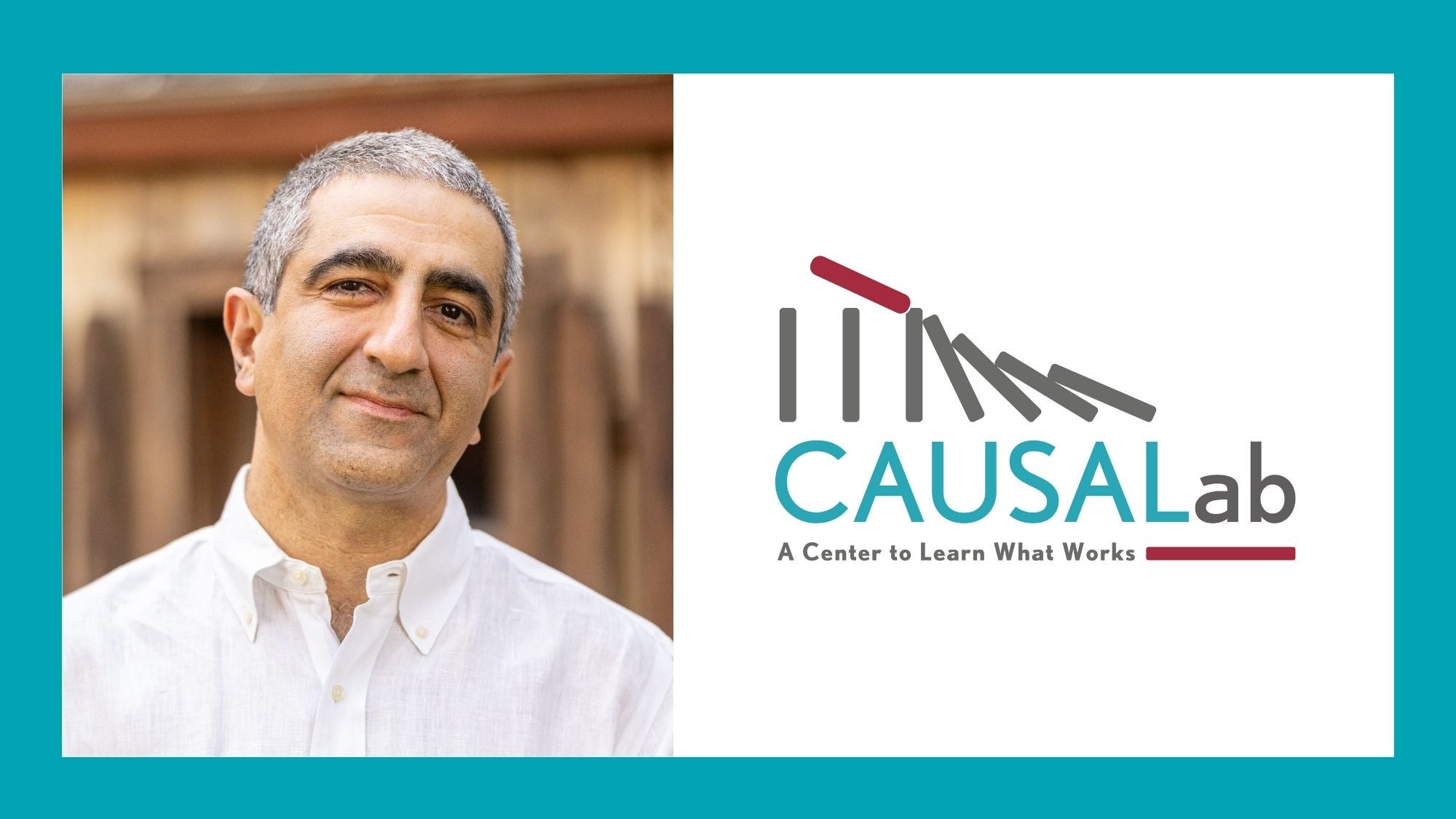
-
Target Trial Emulation Guidance Published in BMJ
A new article published in BMJ outlines procedures for eligibility and treatment assignment for observational target trial emulation. “Starting right: aligning eligibility and treatment assignment at time zero when emulating…

-
Barbra Dickerman Awarded ICI Award
Barbra Dickerman has been selected for a Fall 2025 Innovation in Cancer Informatics (ICI) Major Grant Award! “Developing a Generalizable Causal AI Framework for Precision Sequencing of Cancer Therapies: A…
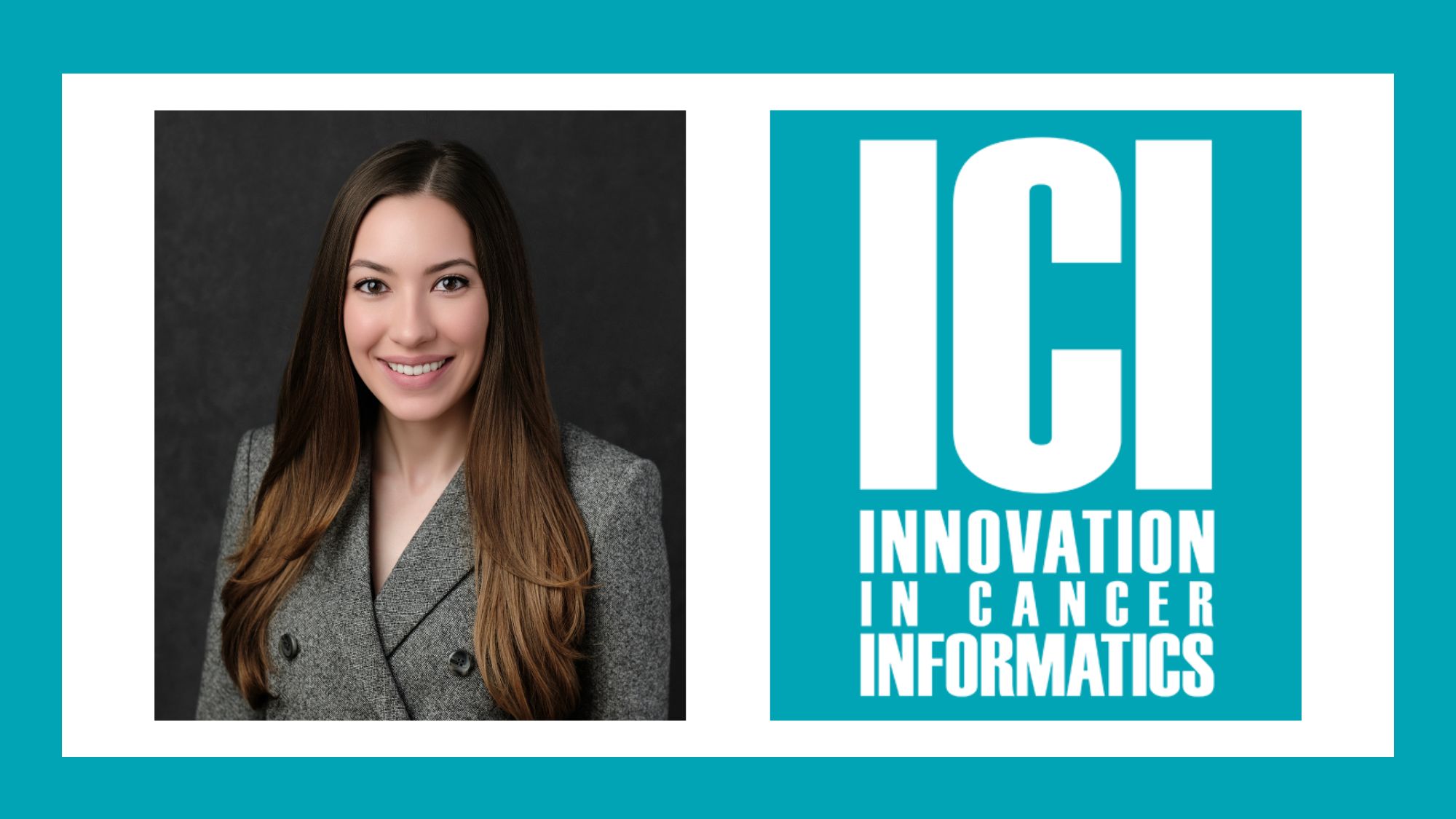
-
CAUSALab Announces 2026 Summer Course Dates
CAUSALab announced the 2026 dates for the 2026 CAUSALab Summer Courses on Causal Inference. Additional information about the 2026 courses, including registration and course details, will be posted on CAUSALab’s…

-
CAUSALab Announces the 20th Kolokotrones Symposium
CAUSALab announced the 20th Kolokotrones Symposium this week. “Acetaminophen During Pregnancy and Autism: What Does Causal Inference Take?” The fall symposium will be held November 14, 2025 (1:30-3:30 PM ET)…

-
New Publication in NEJM AI
How can generative AI advance Target Trial Emulation? In a new editorial published in NEJM AI, authors Issa Dahabreh (CAUSALab, Harvard T.H. Chan School of Public Health), Robert Yeh (Beth…

-
New Role
CAUSALab researcher Jeremy Brown has accepted a new role as Lecturer of Epidemiology at King’s College London! Jeremy will continue working with CAUSALab as a Research Collaborator. The CAUSALab team…
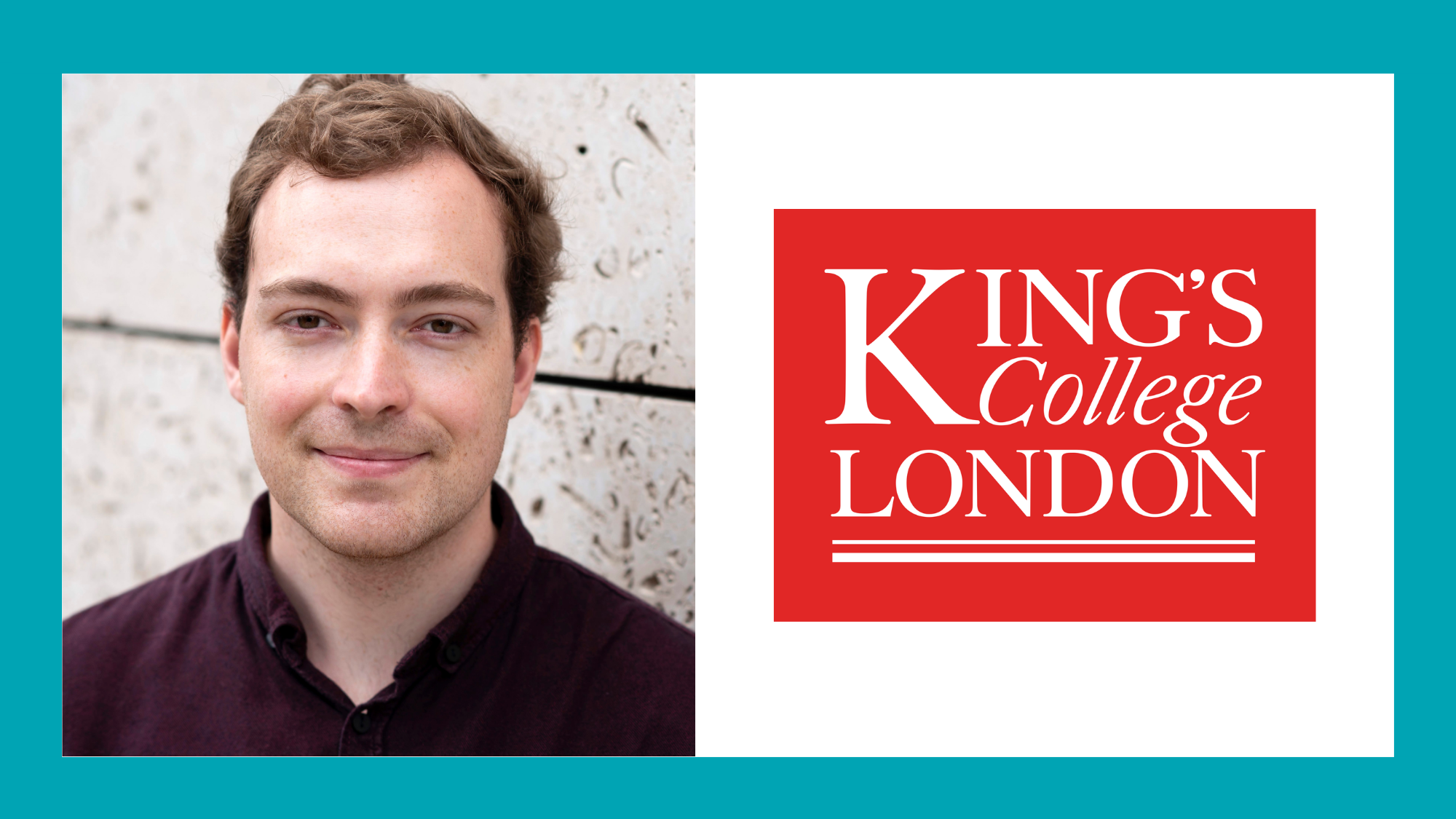
-
TARGET 2025 Guidelines Published in JAMA
The Transparent Reporting of Observational Studies Emulating a Target Trial (TARGET) Statement was published by JAMA on September 3, 2025. TARGET is a consensus-based guidance that aims to “develop consensus-based…

-
Nature Mental Health: Article Publication
A new article published in Nature Mental Health used FEP-CAUSAL Collaboration data to examine comparative effectiveness of antipsychotic medications after first-episode psychosis. The study used two target trials with different…
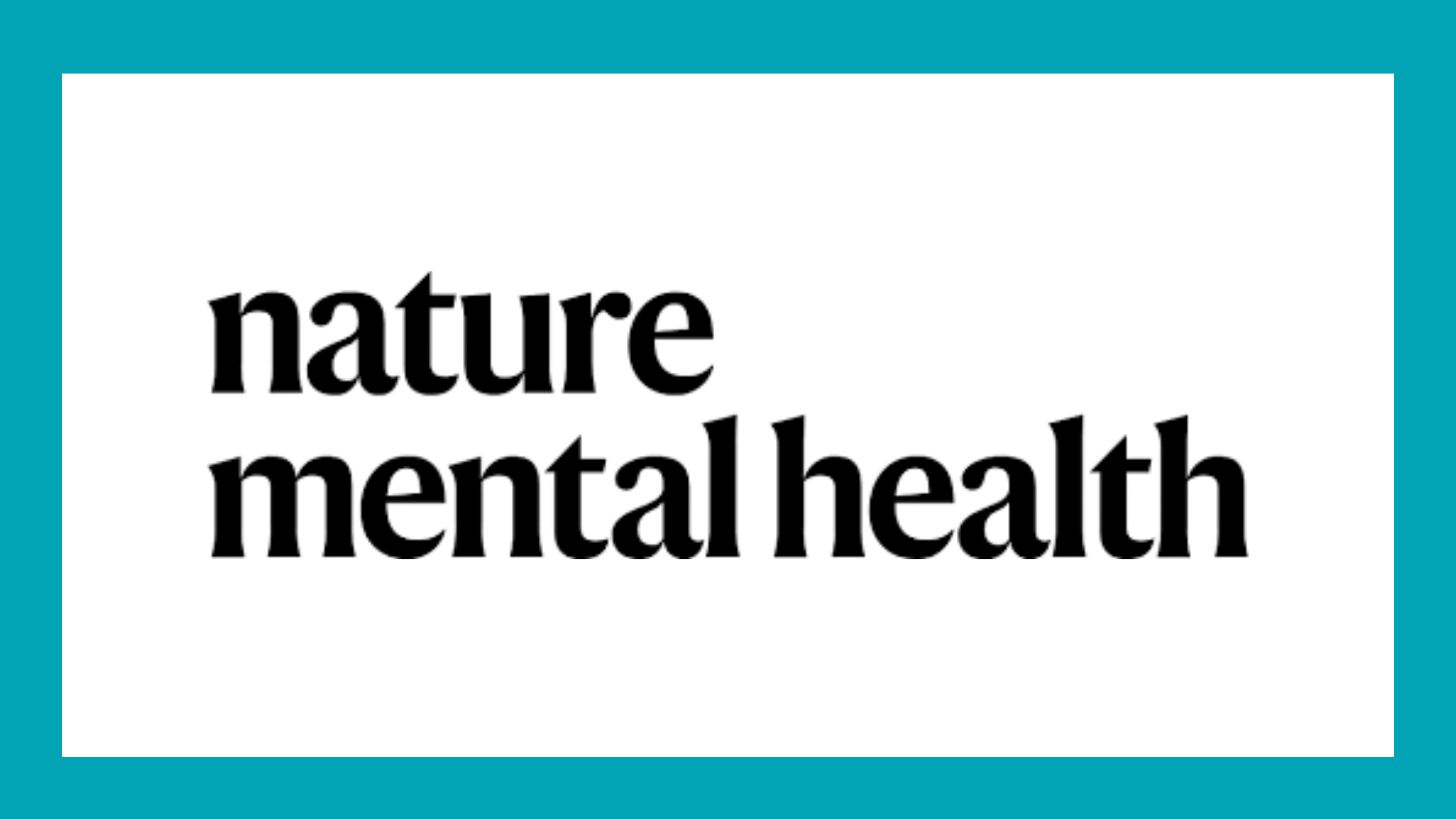
-
James M. Robins Receives COPSS 2025 Award
James M. Robins has been awarded the 2025 Committee of Presidents of Statistical Societies (COPSS) Distinguished Achievement Award and Lectureship! Dr. Robins was recognized by COPSS, “for helping create the…
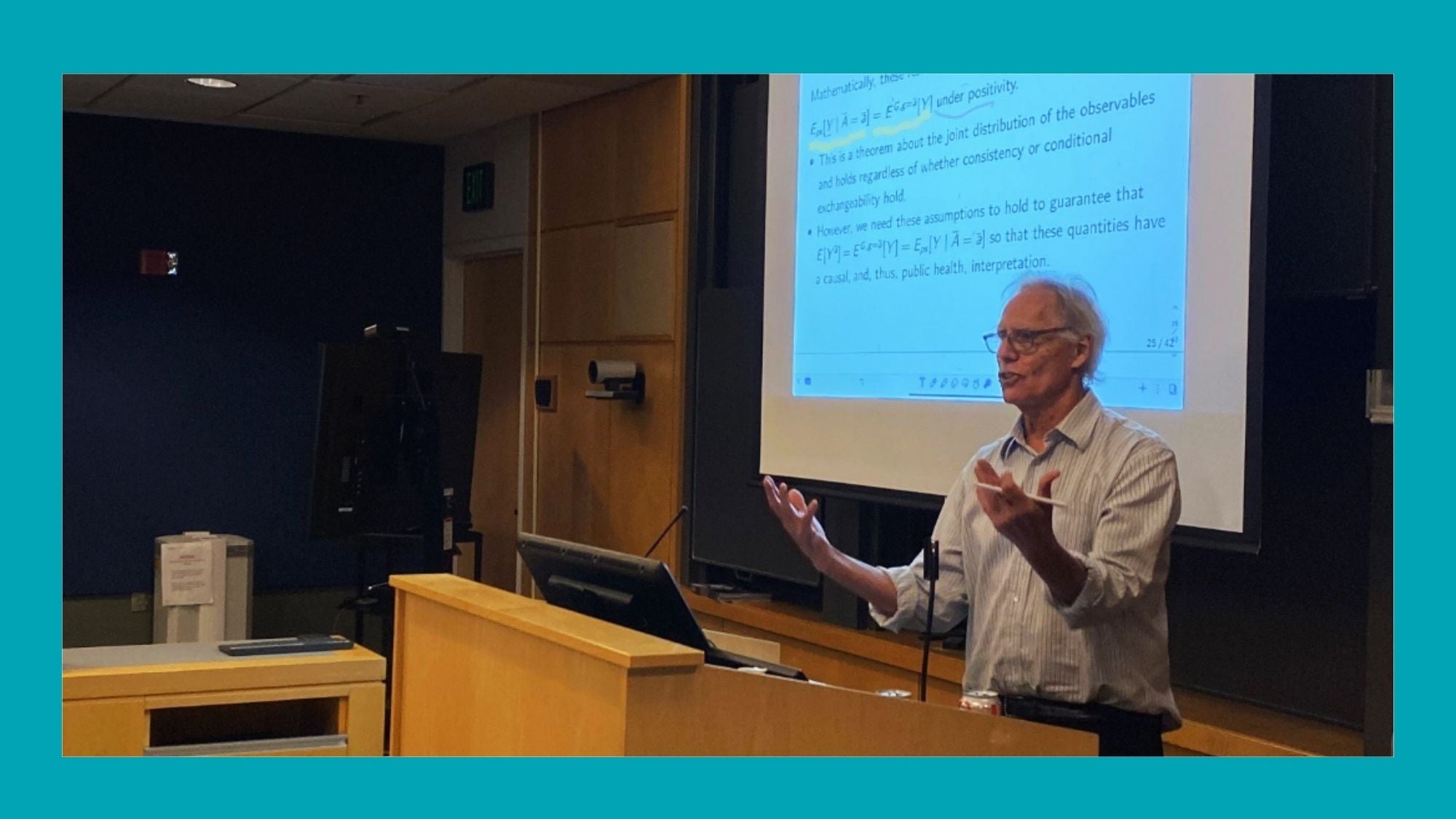
-
New Role
CAUSALab researcher Elizabeth Diemer has accepted a new role as Assistant Professor of Epidemiology in the Penn Medicine Department of Biostatistics, Epidemiology and Informatics at University of Pennsylvania Perelman School…
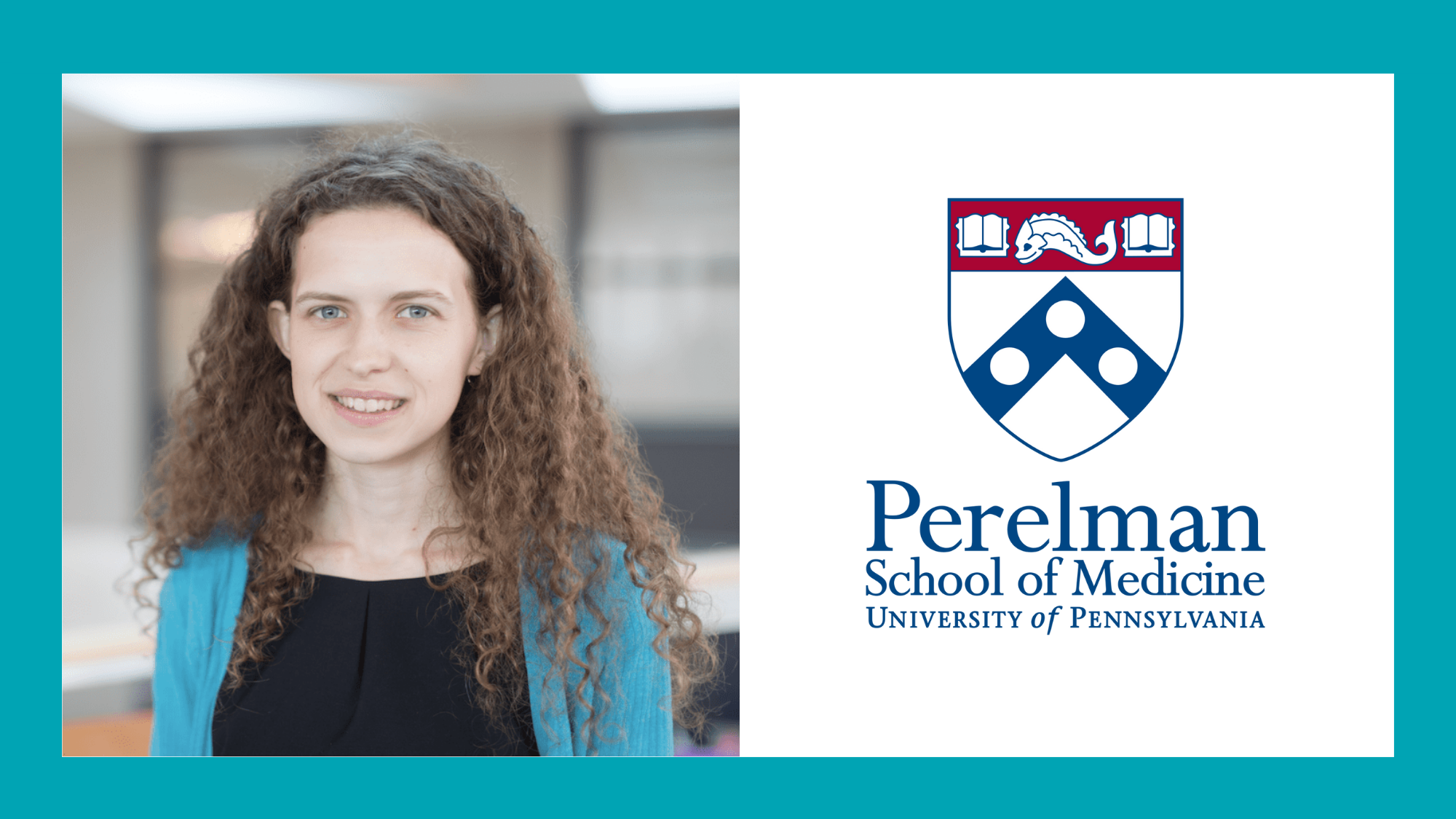
-
CAUSALab Announces 19th Kolokotrones Symposium
CAUSALab has announced the 19th Kolokotrones Symposium, “Building a Learning Health System: the VA-CAUSAL Enterprise.” This hybrid symposium celebrates the 100th anniversary of research for our VA-CAUSAL collaborator, the VA…

-
2025 Course Registration Open
Registration for CAUSALab’s 2025 Summer Courses on Causal Inference is now open! All summer courses take place in Boston, Massachusetts at the Harvard T.H. Chan School of Public Health from…
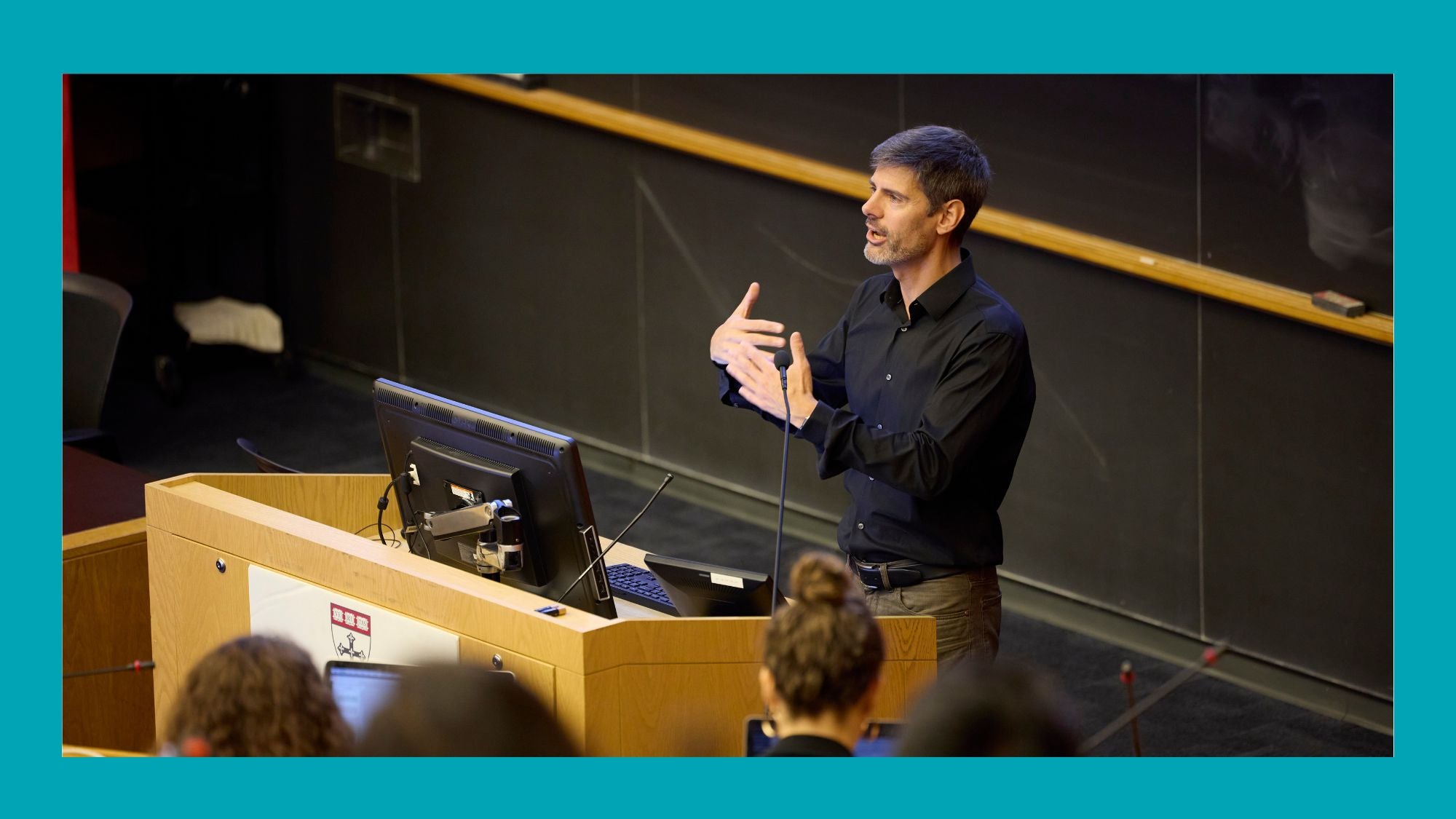
-
New Role
Alejandro Szmulewicz has been promoted to Assistant Professor of Epidemiology at Harvard T.H. Chan School of Public Health. Congratulations, Alejandro! About The Author CAUSALab generates, repurposes and analyzes health data…
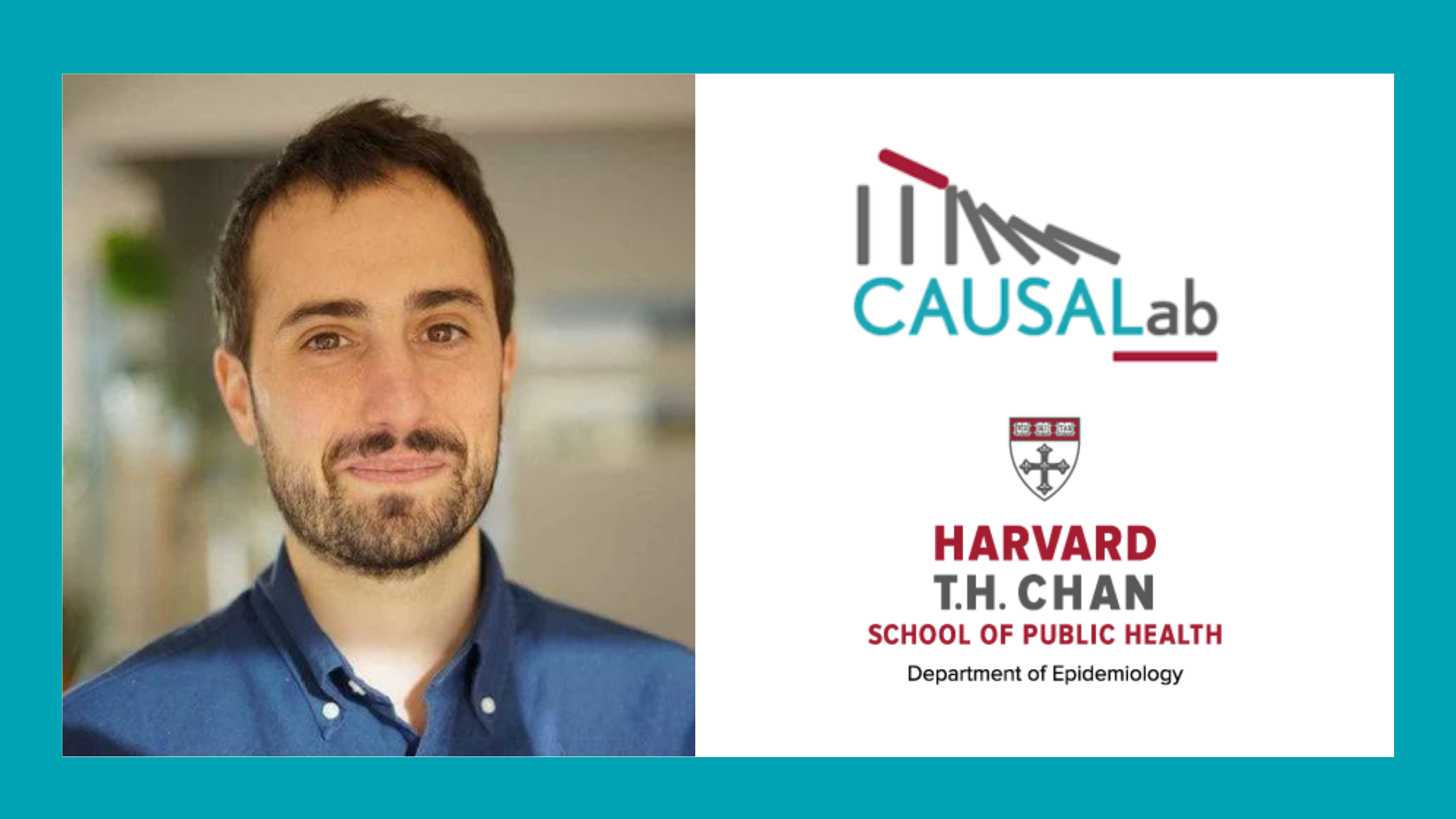
-
New Role
Joy Shi has accepted a new role as Assistant Professor of Medicine in the MGH Mongan Institute at Massachusetts General Hospital! We are thrilled to continue working together with Joy…

-
18th Kolokotrones Symposium a Success
The 18th Kolokotrones Symposium, “Causal Inference for Population Mental Health,” was held on November 15, 2024 and explored the various causal challenges facing mental health researchers and practitioners. The symposium…

-
Emma McGee Selected for 13th Annual Women in Medicine and Science Symposium
CAUSALab researcher Emma McGee was selected to present at Mass General Brigham’s 13th Annual Women in Medicine and Science Symposium, held September 25, 2024, which highlights the achievements of women…

-
New Role
CAUSALab researcher Sophia Rein has been promoted to Research Associate at Harvard T.H. Chan School of Public Health. Congratulations, Sophia! About The Author CAUSALab generates, repurposes and analyzes health data…
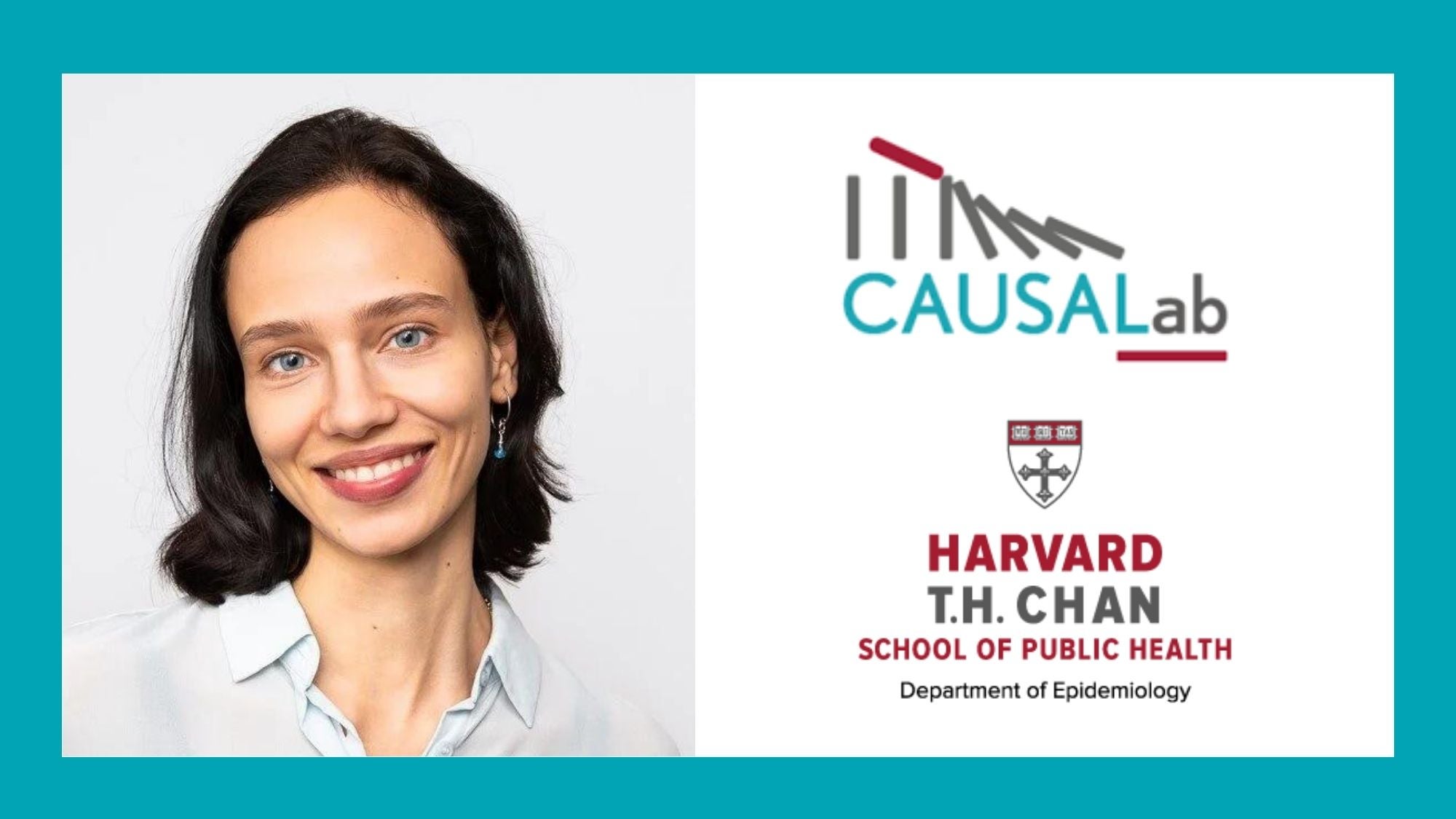
-
CAUSALab Funding: PCORI
Project “Remote Alert Pathway to Optimize CaRe of Cardiac Implantable Electrical Devices: RAPTOR-CIED” has been awarded $30 million in research funding by Patient-Centered Outcomes Research Institute (PCORI). This is a…
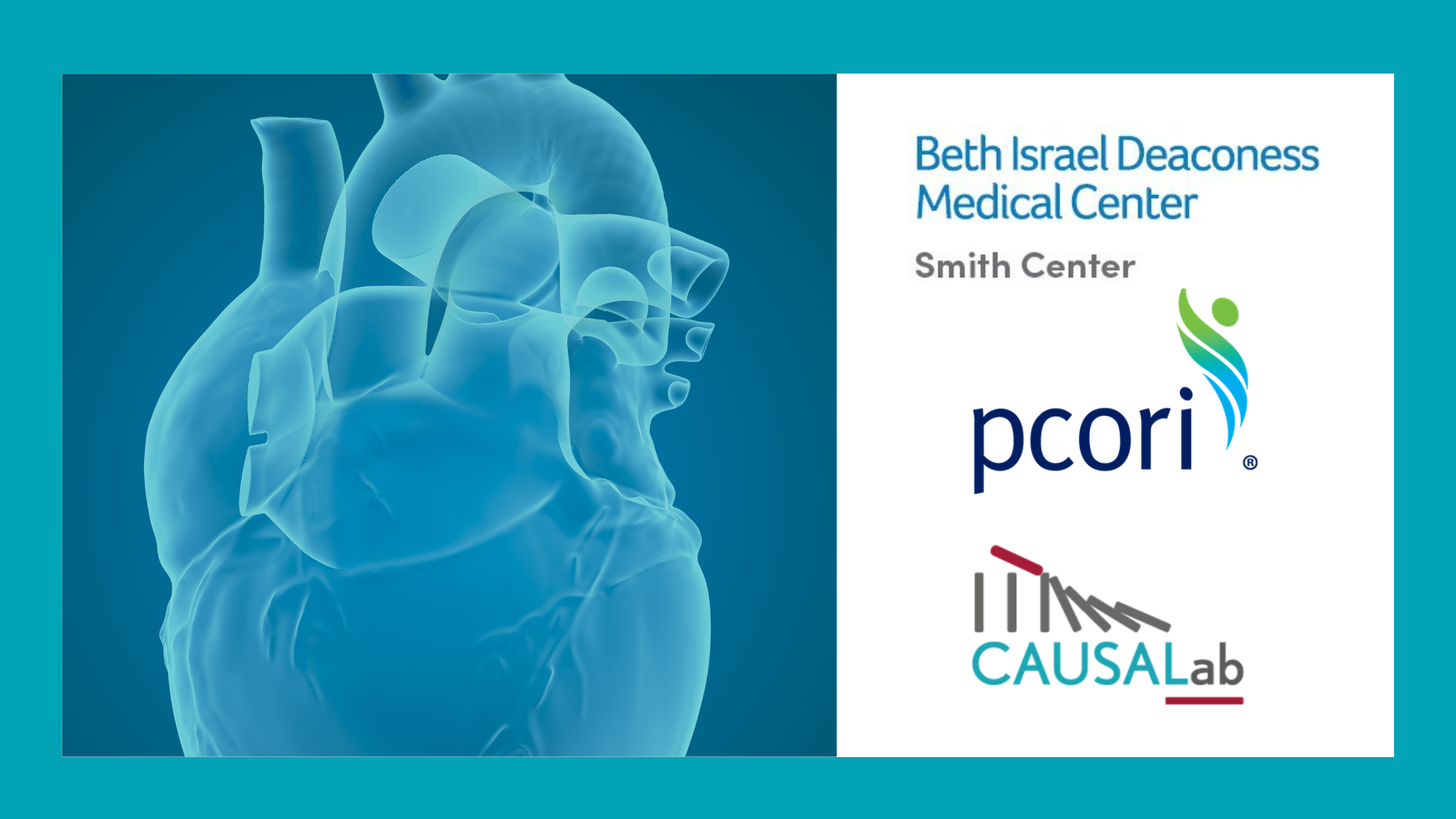
-
Gonzalo Martínez-Alés Awarded New Suicide Research Grant
CAUSALab & Mount Sinai Health System researcher Gonzalo Martínez-Alés was awarded a new grant by the American Foundation for Suicide Prevention in June 2024. “Effectiveness of Pharmacological Interventions to Prevent…
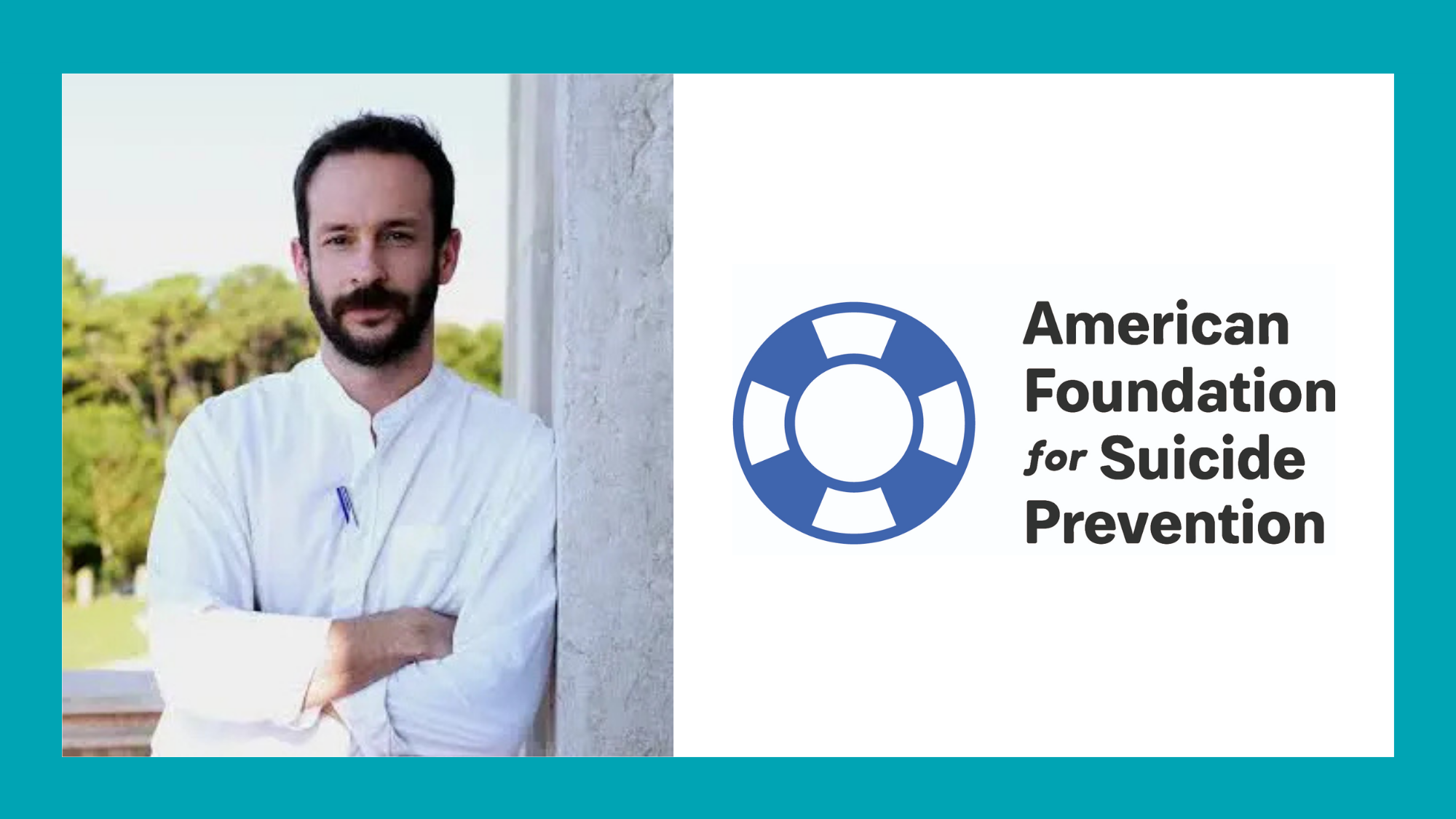
-
CNN Research Feature: Metformin & Pregnancy Risk
New research featured in CNN challenges past scholarship on metformin and its impact on pregnancy. The study by Yu-Han Chiu et al published in Annals of Internal Medicine found that women with…

-
New GitHub Release
Live on GitHub! The gfoRmulaICE package implements iterative conditional expectation (ICE) estimators of the plug-in g-formula (links included below). Both singly robust and doubly robust ICE estimators based on parametric…

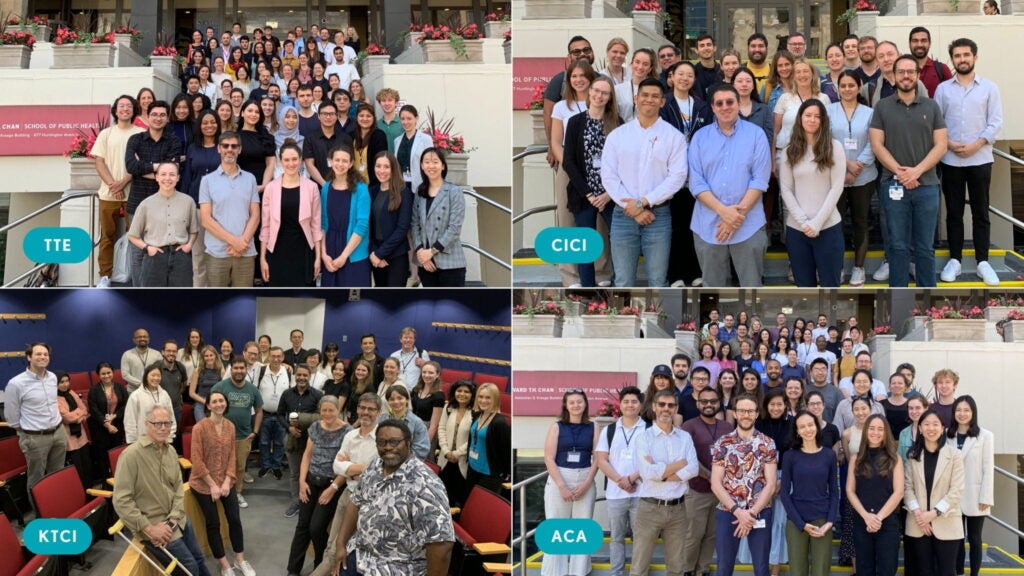
2024 Summer Courses on Causal Inference a Success
CAUSALab ran its annual summer courses June 3-14, 2024. The 2024 courses welcomed 381 attendees from over 35 countries and 180 organizations.
Attendees participated in four causal inference courses: Key Topics in Causal Inference (KTCI), Advanced Confounding Adjustment (ACA), Combining Information for Causal Inference (CICI), and Target Trial Emulation (TTE). Thank you to our wonderful instructors and fellows!
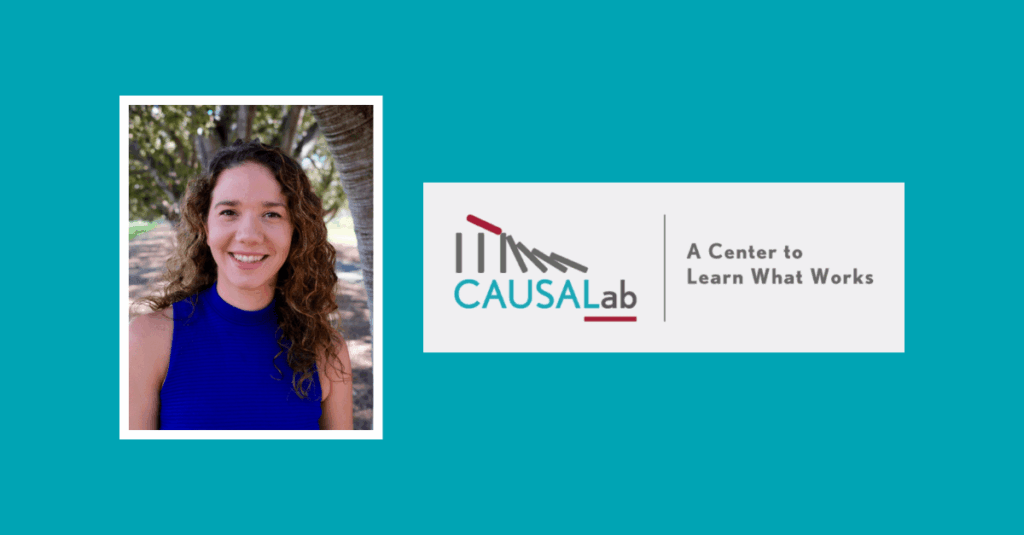
Promotion
CAUSALab researcher Daniela van Santen has been promoted to Research Associate at Harvard T.H. Chan School of Public Health. Congrats, Daniela!
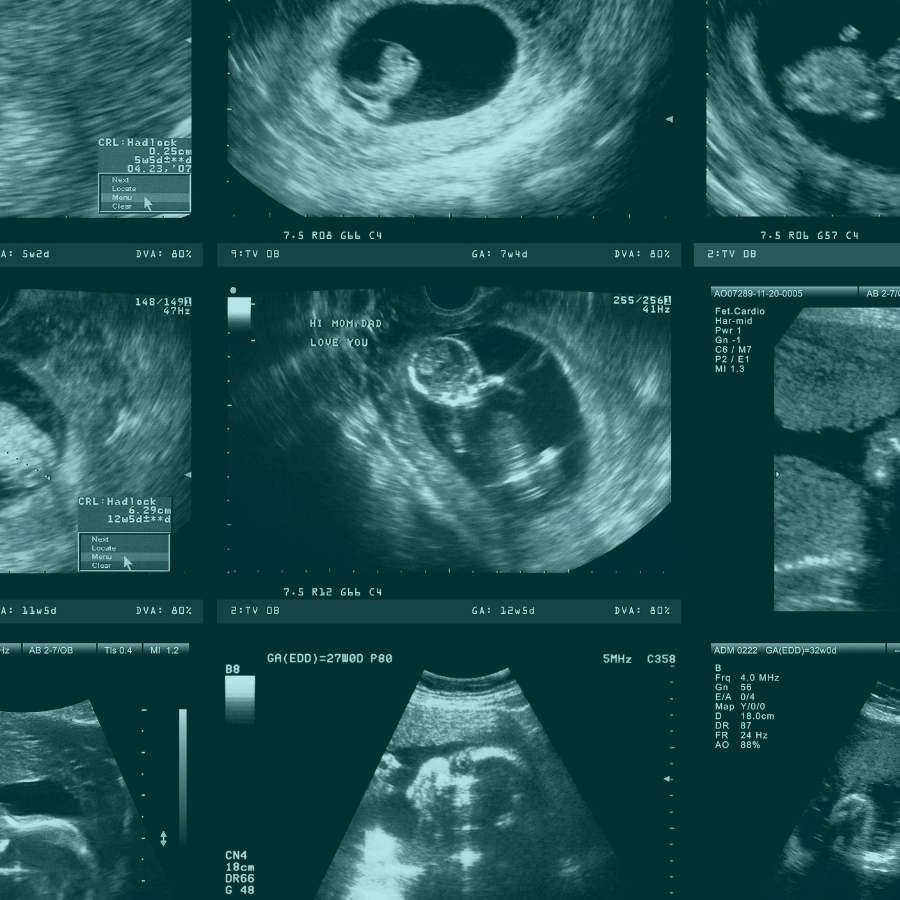
New Publication: Risk of Autism after Prenatal Topiramate, Valproate, or Lamotrigine Exposure
Several antiseizure medications are known teratogens. Limited data exists, however, for the association between maternal use of drugs such as topiramate, valproate and lamotrigine during pregnancy and the risk for autism spectrum disorder.
In a recent article co-authored by CAUSALab faculty member Sonia Hernández-Díaz and published in NEJM Group’s New England Journal of Medicine, researchers investigated this association using a pregnant population-based cohort. Children exposed to antiseizure medications during the second half of pregnancy (beginning gestational week 19) were compared to those not exposed in utero.
Findings suggest that topiramate —an antiseizure medication prescribed to treat epilepsy as well as migraines and bipolar disorder—does not appear to increase the risk of autism spectrum disorder among children exposed to it prenatally. While children exposed to all the studied antiseizure medications had a higher risk of autism than the general population, after adjusting for indication and other confounding variables, exposure to topiramate and lamotrigine was no longer associated, while prenatal exposure to valproate remained associated with additional risk.
This research was funded by the National Institute of Mental Health (NIMH). Read the full article
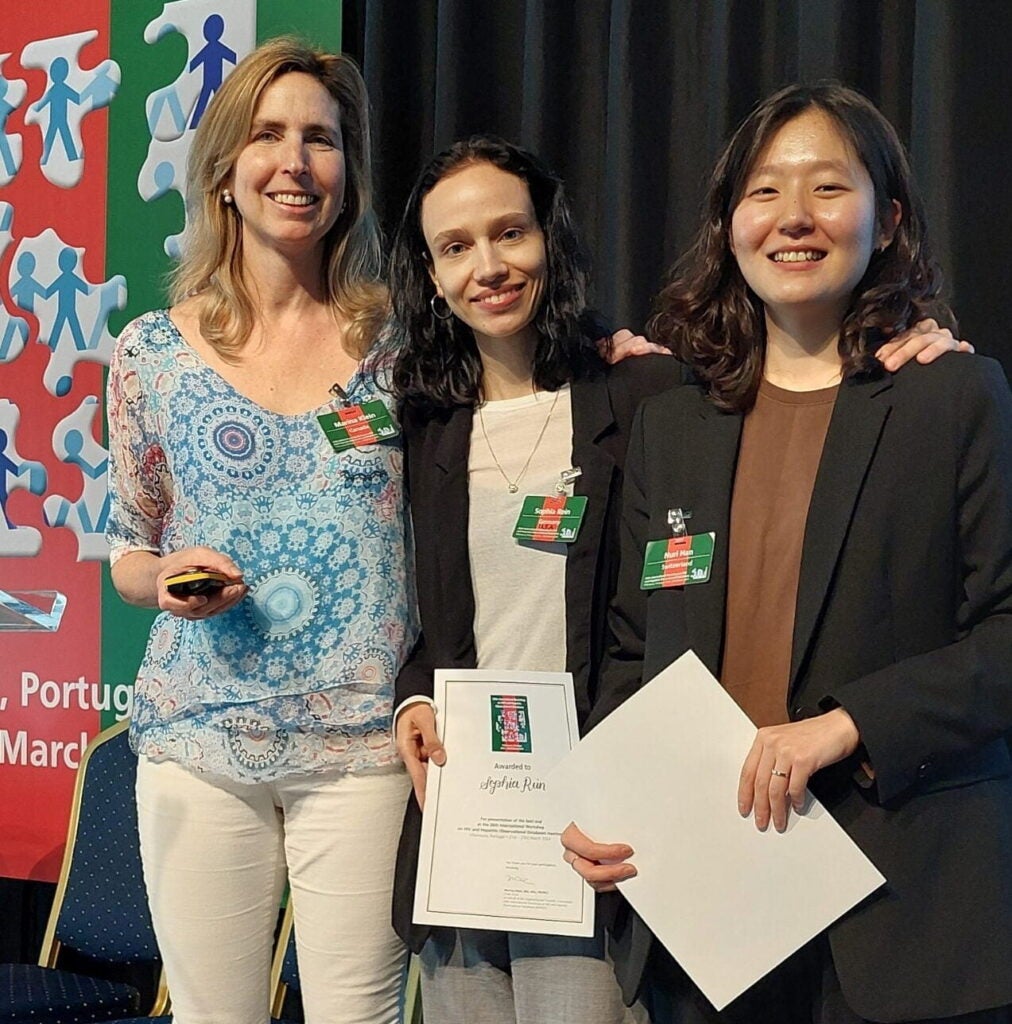
Sophia Rein Wins IWHOD 2024 Young Investigator Award
Sophia Rein received a Young Investigator Award for her oral presentation “Effect of switching from triple to dual ART on virologic failure: A target trial emulation using observational data, from the cohort HIV Cohorts Analyzed Using Structural Approaches to Longitudinal data” during the March 2024 International Workshop on HIV and Hepatitis Observational Databases (IWHOD) in Vilamoura, Portugal.
IWHOD brings HIV and hepatitis database researchers together to advance observational data analysis.

CAUSALab Announces Collaboration with Broad Institute of MIT and Harvard
CAUSALab director, Miguel Hernán, has received a Multidisciplinary University Research Initiative (MURI) funding award from the United States Department of Defense as a collaborator on a new project with the Broad Institute of MIT and Harvard titled, “Evaluating, Predicting, Optimizing, and Monitoring Hypothetical Interventions in Large Networked Systems.” The research team will develop a computational decision-making framework centered on intervention design for engineering, biomedical and societal application.
The MURI program, founded in 1985, fosters cross-institution collaboration amongst teams with diverse expertise to accelerate scientific advancement on topics key to national defense.
US Department of Defense press release published March 8, 2024.
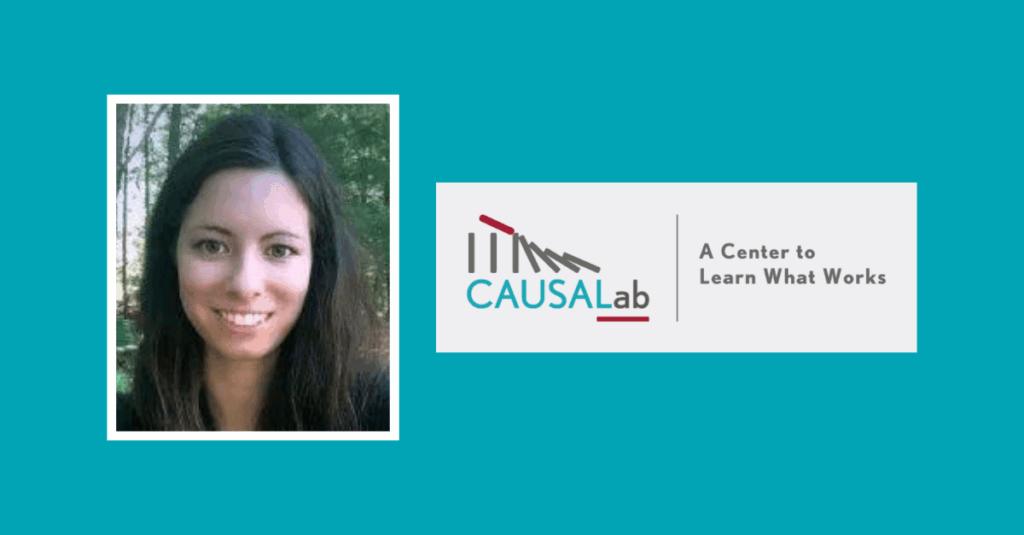
Promotion
CAUSALab researcher Sarah Robertson has been promoted to Research Associate at Harvard T.H. Chan School of Public Health. Congrats, Sarah!
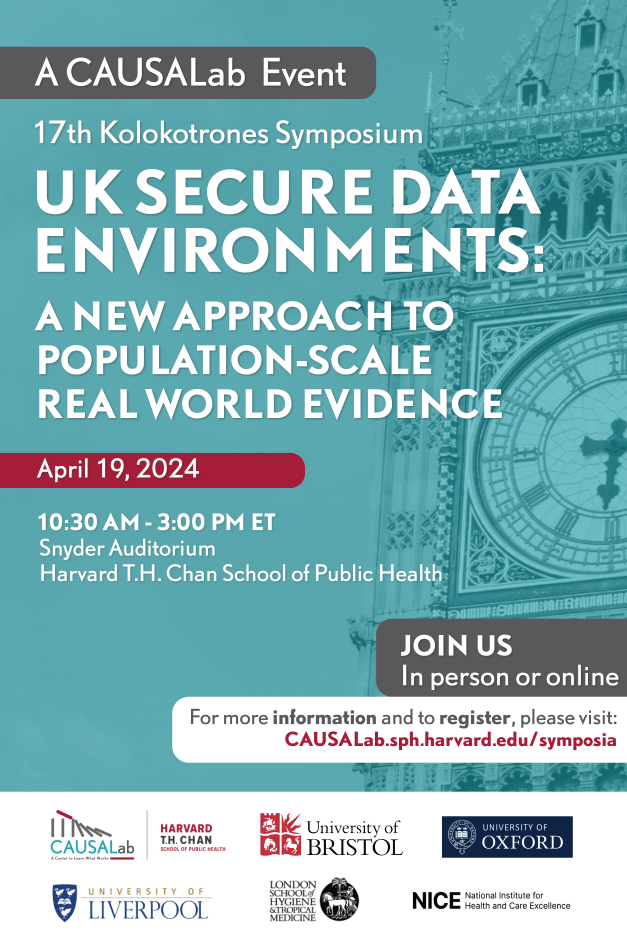
17th Kolokotrones Symposium Announced
CAUSALab has officially announced the 17th Kolokotrones Symposium! The symposium is a collaboration with researchers at University of Bristol, University of Oxford, University of Liverpool, London School of Hygiene and Tropical Medicine & National Institute for Health Care and Excellence (NICE) and will explore the English approach to medicine data & electronic health records from the lens of causal inference research.
Information about “UK Secure Data Environments: A New Approach to Population-Scale Real World Evidence” is live on our website.
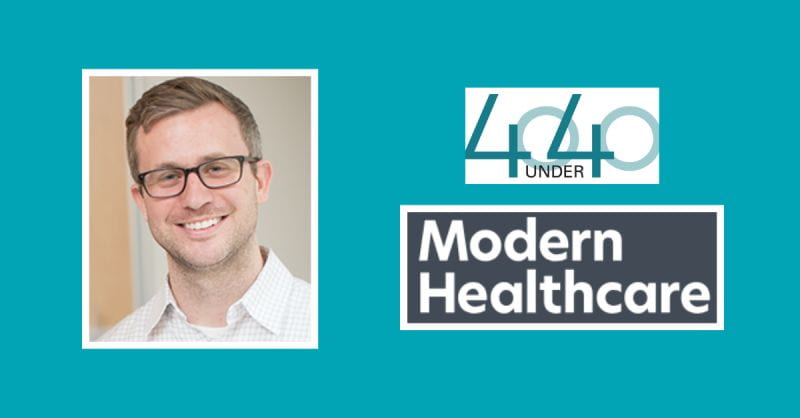
Andrew Beam Named Modern Healthcare 40 Under 40 Recipient
CAUSALab faculty member Andrew Beam has been included on Modern Healthcare’s 40 Under 40 Class of 2024 list! Andrew’s contributions to AI research & machine learning, both inside and outside the classroom, landed him a spot amongst this year’s class. His research in the neonatal intensive care setting is highlighted as a notable contribution to the field in his award. Andrew was nominated by NEJM AI, a monthly journal from NEJM Group on which he serves as Deputy Editor. The 40 Under 40 list is selected by senior editors at Modern Healthcare and features individuals who have demonstrated “perseverance, flexibility and innovation” while creating a measurable impact to any sector of healthcare. Read the feature here.
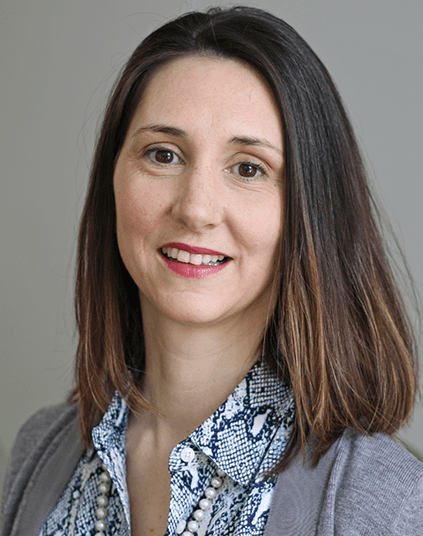
Sara Lodi Joins Summer Course Instructor Team
Sara Lodi has joined the Key Topics in Causal Inference (KTCI) instructor team for the 2024 CAUSALab causal inference courses. Sara is an Associate Professor of Biostatistics in the Department of Biostatistics Boston University School of Public Health and an Adjunct Associate Professor in the Department of Epidemiology, Harvard T.H. Chan School of Public Health. She joins Miguel Hernán, Judith Lok, James Robins, Eric Tchetgen Tchetgen & Tyler VanderWeele for the June 3-7, 2024 course.
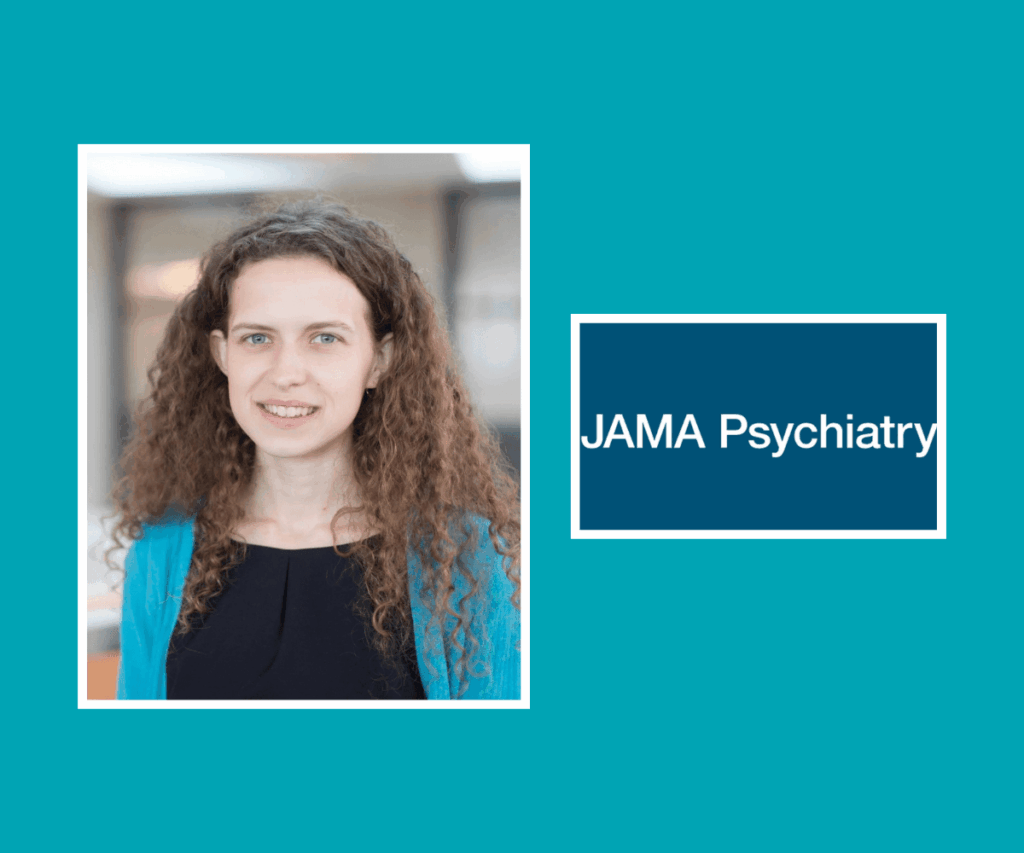
Elizabeth Diemer – JAMA Psychiatry Appointment
One of CAUSALab’s Research Associates, Elizabeth Diemer, has received a new appointment as Statistical Editor at JAMA Psychiatry beginning January 2024. JAMA Psychiatry is an international peer-reviewed journal for clinicians, scholars, and research scientists in psychiatry, mental health, behavioral science, and allied fields. Check out her profile and recent publications, including “Falsification of the instrumental variable conditions in Mendelian randomization studies in the UK Biobank” published in European Journal of Epidemiology here.

New Publication: Affiliation Bias in Peer Review of Abstracts
To meet a growing number of academic abstract submissions, scientific journals have begun using learned language models (LLM) to streamline peer review. It is unclear, however, how LLMs may perpetuate (or decrease) affiliation bias in this process.
In a recent research letter published December 2023 and co-authored by CAUSALab researcher Denys Shay in addition to Dario von Wedel, Rico André Schmitt, Moritz Thiele, Raphael Leuner, Simone Redaelli and Maximilian S. Schaefer, researchers investigated this question by prompting ChatGPT-3.5 to act as a peer reviewer for 30 abstracts. They then tested affiliation combinations and analyzed corresponding acceptance & rejection rates. Analysis indicates an association between high-tier institutions and LLM acceptance rates may exist, but limitations must be taken into consideration.
Read the full letter published is JAMA here.
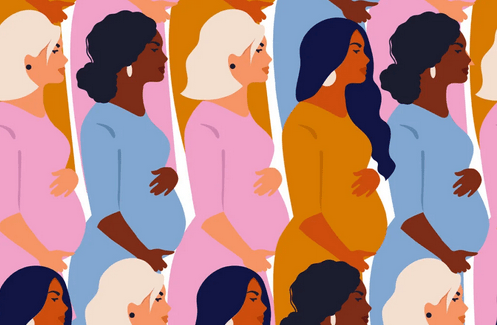
Article Feature: 16th Kolokotrones Symposium
Harvard T.H. Chan School of Public Health recently published an article on the CAUSALab’s December 2023 16th Kolokotrones Symposium – Causal Inference in Pregnancy: Real World Data when Randomized Trials are Impractical. The event featured several distinguished speakers (Sonia Hernandez-Diaz, Anne Drapkin Lyerly, Leyla Sahin, Sonja A. Rasmussen, Lee S. Cohen, Krista F. Huybrechts, Brian Bateman) and was cosponsored by Harvard Program on Perinatal and Pediatric Pharmacoepidemiology. Read the article here. Watch the event recordings here.
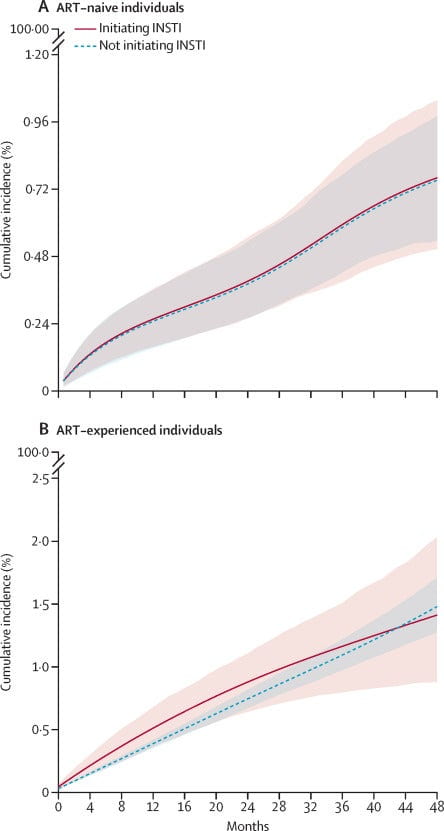
New Study: Integrase strand-transfer inhibitor use and cardiovascular events in adults with HIV
CAUSALab researcher Sophia Rein (et. al.) published a paper in The Lancet HIV on “Integrase strand-transfer inhibitor use and cardiovascular events in adults with HIV: an emulation of target trials in the HIV-CAUSAL Collaboration and the Antiretroviral Therapy Cohort Collaboration.” This research was funded by the National Institute of Allergy and Infectious Diseases and National Institute on Alcohol Abuse and Alcoholism. A recent observational study suggested that the risk of cardiovascular events could be higher among antiretroviral therapy (ART)-naive individuals with HIV who receive integrase strand-transfer inhibitor (INSTI)-based ART than among those who receive other ART regimens. The team aimed to emulate target trials separately in ART-naive and ART-experienced individuals with HIV to examine the effect of using INSTI-based regimens versus other ART regimens on the 4-year risk of cardiovascular events. You can read the abstract and paper here. Sophia was invited to a podcast from The Lancet HIV. Listen to her talk about the team’s research on Spotify here or on The Lancet HIV‘s website here.
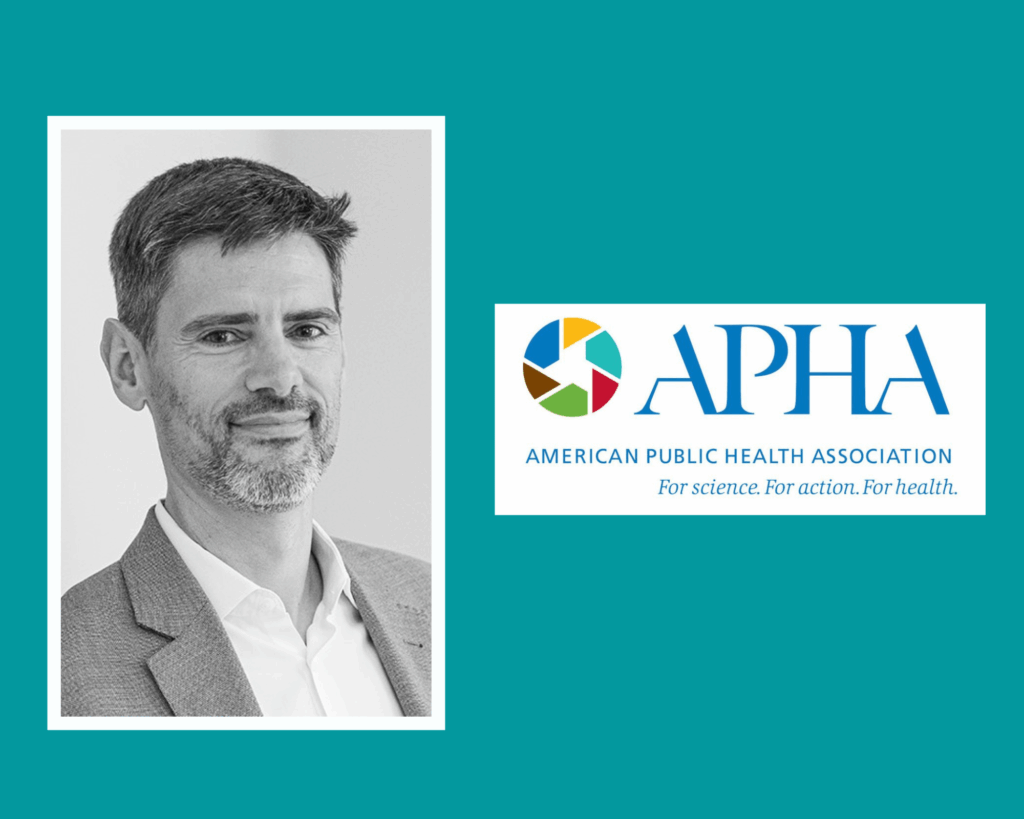
Miguel Hernan – 2023 Lowell Reed Lectureship Award
CAUSALab’s Director, Miguel Hernan, is the recipient of the prestigious 2023 Lowell Reed Lectureship Award. This award is in recognition of Dr. Hernan’s groundbreaking work in the field of causal inference and his contribution to shape health policy and research methodology worldwide. Dr. Hernan gave his lecture on “Making decisions is hard, but making decisions without data is even harder: Lessons for the next public health crisis” at the award ceremony of APHA’s Applied Public Health Statistics Section, at the APHA conference in Atlanta, GA on Tuesday, November 14, 2023.
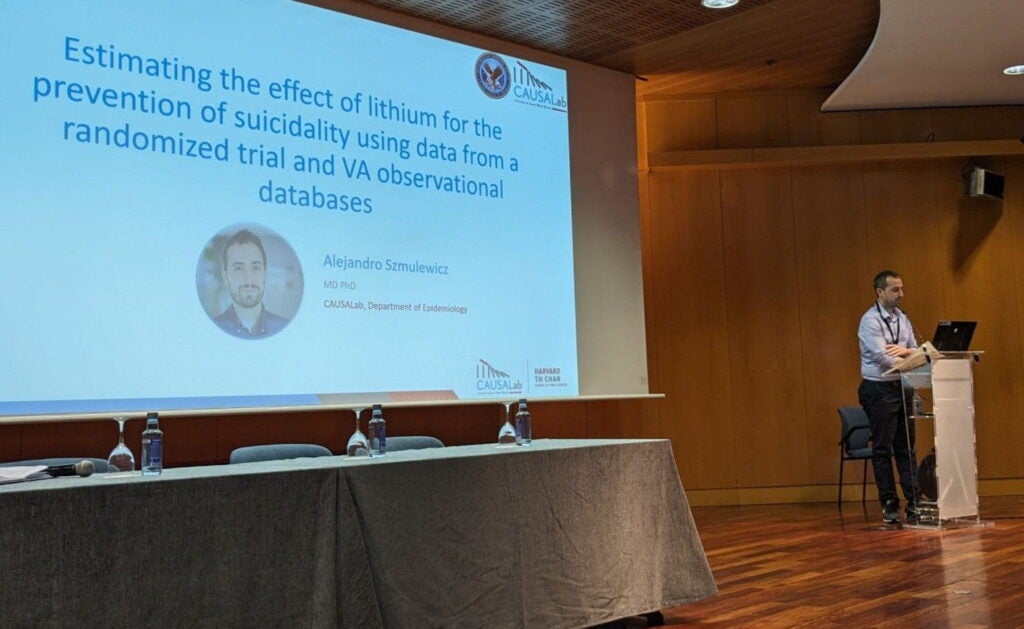
Alejandro Szmulewicz – International Summit on Suicide Research
CAUSALab instructor Alejandro Szmulewicz presented his research “Estimating the effect of lithium for prevention of suicidality using data from a randomized trial and VA observational databases” at the October 2023 International Summit on Suicide Research took place in Barcelona, Spain.
Alejandro was also a featured panelist during the conference. His work is supported by VA Boston and the U.S. Department of Veteran Affairs.
The International Summit on Suicide Research engages an interdisciplinary group of researchers studying topics ranging from brain function, genetics, rates of suicide and factors that contribute to suicide as well as approaches to intervention and prevention.
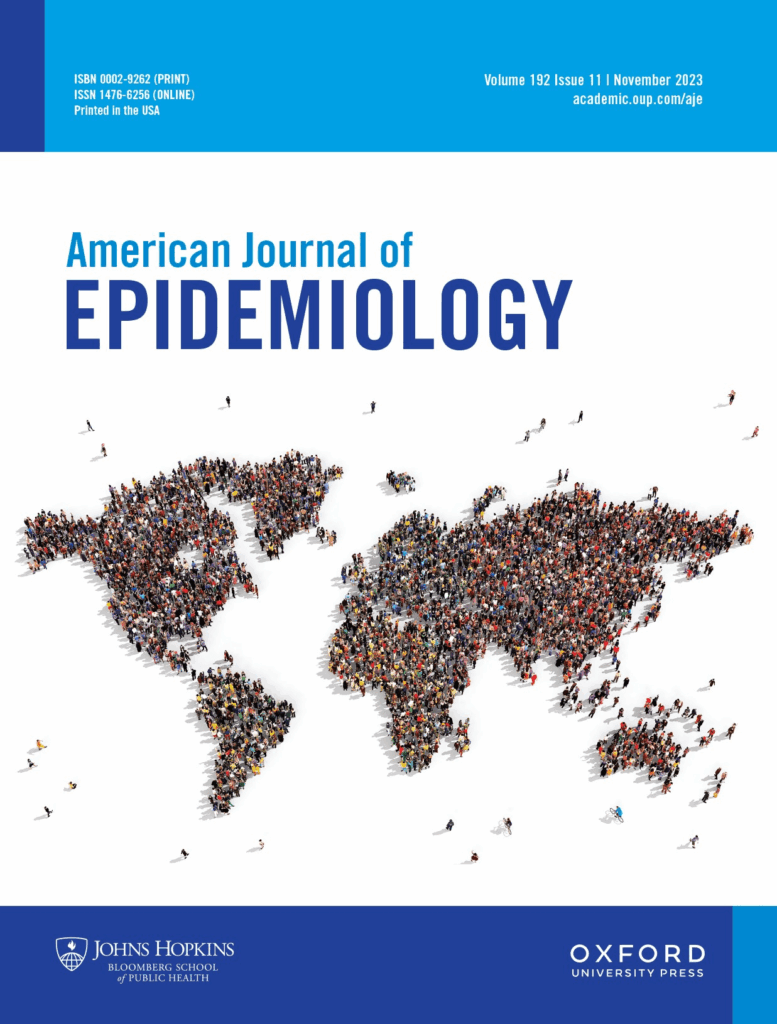
New Study
CAUSALab researchers Yu-Han Chiu, Lan Wen, Roger Logan, Issa Dahabreh, Miguel A Hernan along with CAUSALab research collaborators, Lan Wen and Sean McGrath, published a paper in the American Journal of Epidemiology, Evaluating Model Specification When Using the Parametric G-Formula in the Presence of Censoring.
Abstract is shared below and you can access the paper here:
The noniterative conditional expectation (NICE) parametric g-formula can be used to estimate the causal effect of sustained treatment strategies. In addition to identifiability conditions, the validity of the NICE parametric g-formula generally requires the correct specification of models for time-varying outcomes, treatments, and confounders at each follow-up time point. An informal approach for evaluating model specification is to compare the observed distributions of the outcome, treatments, and confounders with their parametric g-formula estimates under the “natural course.” In the presence of loss to follow-up, however, the observed and natural-course risks can differ even if the identifiability conditions of the parametric g-formula hold and there is no model misspecification. Here, we describe 2 approaches for evaluating model specification when using the parametric g-formula in the presence of censoring: 1) comparing factual risks estimated by the g-formula with nonparametric Kaplan-Meier estimates and 2) comparing natural-course risks estimated by inverse probability weighting with those estimated by the g-formula. We also describe how to correctly compute natural-course estimates of time-varying covariate means when using a computationally efficient g-formula algorithm. We evaluate the proposed methods via simulation and implement them to estimate the effects of dietary interventions in 2 cohort studies
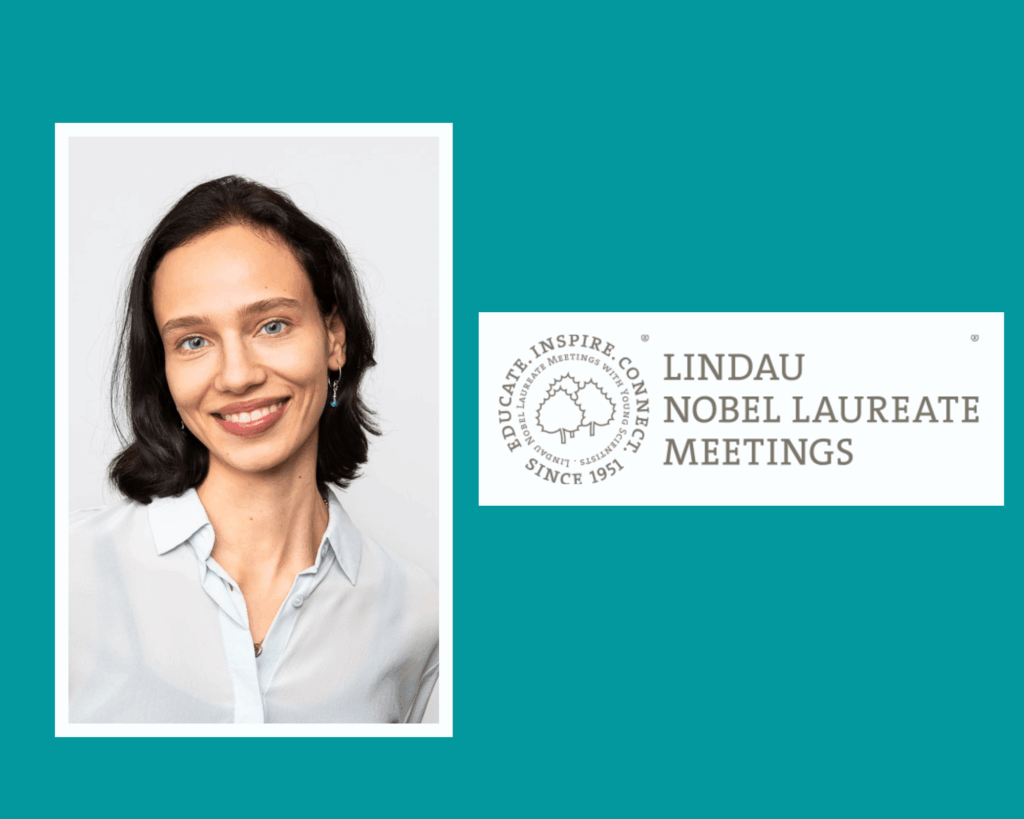
Sophia Rein – Selected to attend the 72nd Lindau Nobel Laureate Meeting
CAUSALab researcher Sophia Rein was selected to attend the 72nd Lindau Nobel Laureate Meeting that was held June 25-30, 2023 in Lindau, Germany. This is a prestigious achievement as this invitation is only extended to “the 600 most qualified scientists from all around the world.” The Lindau Nobel Laureate Meetings – established in 1951 – provide a globally recognized forum for exchange between Nobel Laureates and young scientists. They inspire scientific generations and build sustainable networks of young scientists around the world. You can learn more about the Lindau Nobel Laureate Meetings on their website here.

New Study: Estimating the per-protocol effect of lithium on suicidality in a randomized trial of individuals with depression or bipolar disorder
CAUSALab researchers Alejandro Szmulewicz and Miguel Hernan published an article in the Journal of Psychopharmacology, Estimating the per-protocol effect of lithium on suicidality in a randomized trial of individuals with depression or bipolar disorder. This research was part of the VA-CAUSAL collaboration, a partnership between CAUSALab and the Veterans Affairs (VA) Boston Healthcare System.
Because most randomized trials looking at the effect of lithium on the risk of suicidality (attempts, deaths, hospitalizations) have high rates of non-adherence, it is possible that a beneficial effect of lithium may have been diluted by the non-adherence and thus undetected by the intention-to-treat analysis. They reanalyzed the data from the CSP590 trial, a recent randomized trial conducted in the VA, to estimate the per-protocol effect of lithium use on recurrent suicidality among patients with affective disorders. You can read the abstract and study here.
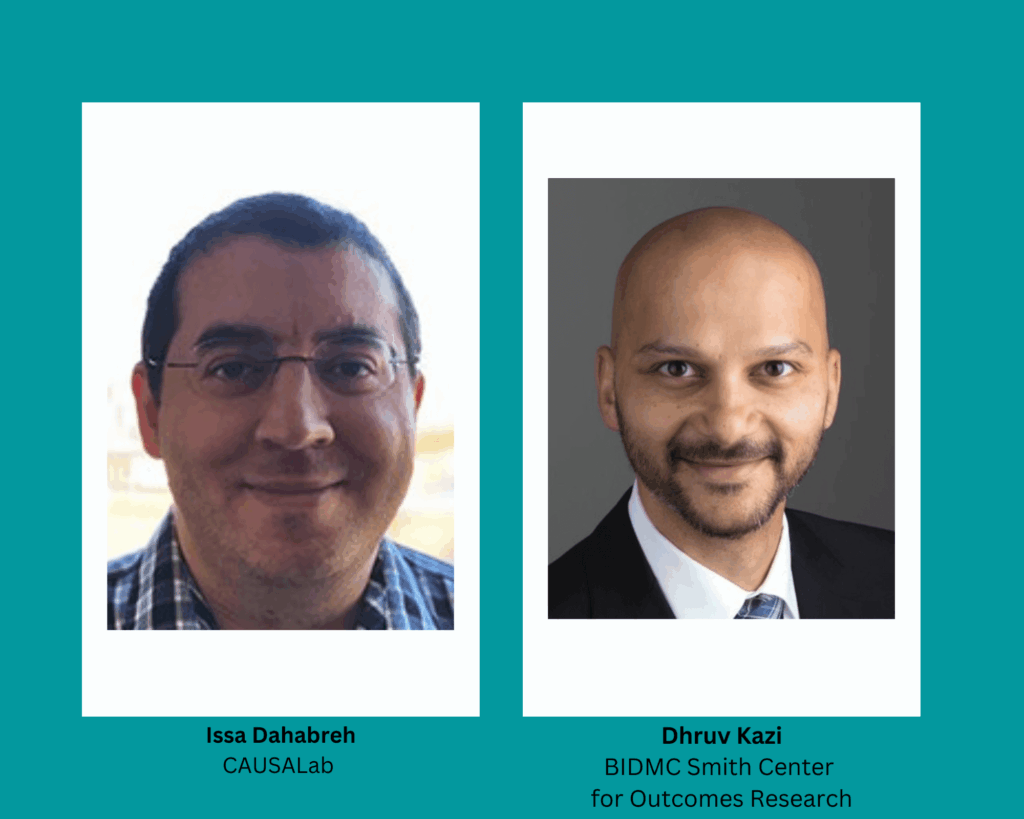
Editorial – Toward Personalizing Care: Assessing Heterogeneity of Treatment Effects in Randomized Trials
CAUSALab researcher and Associate Professor Issa Dahabreh and BIDMC Smith Center for Outcomes Research Associate Director Dhruv Kazi published an editorial in JAMA Network on their insights on the study, Heterogeneous Treatment Effects of Therapeutic-Dose Heparin in Patients Hospitalized for COVID-19.
To view the editorial piece, check it out on JAMA Network here.
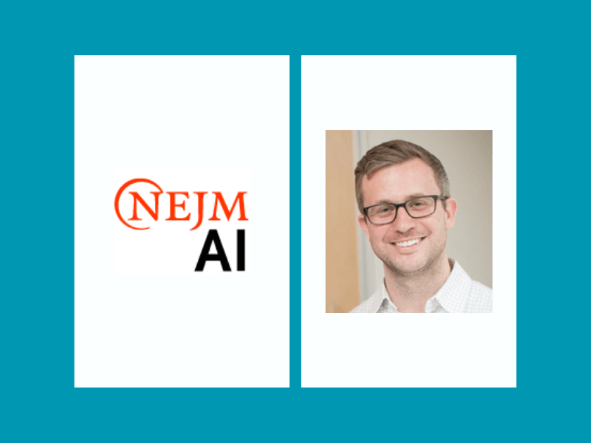
Andrew Beam – Founding Editor of New Journal, NEJM AI
CAUSALab researcher, Andrew Beam, is a Founding Editor of a new exciting journal, NEJM AI. This new journal comes from NEJM Group, the publisher of New England Journal of Medicine (NEJM) with the purpose to “identify and evaluate state-of-the-art applications of artificial intelligence to clinical medicine. In addition to original research, NEJM AI will provide reviews, policy perspectives, and accessible education material targeted at practicing physicians and clinician leaders interested in applying AI, computer scientists seeking to translate algorithmic advances to clinical practice, and policy makers and regulators.” Learn more on NEJM AI’s site here.

New Study: Emulating a Target Trial of Interventions Initiated During Pregnancy with Healthcare Databases: The Example of COVID-19 Vaccination
Observational studies are often the only option to estimate effects of interventions during pregnancy. Causal inference from observational data can be conceptualized as an attempt to emulate a hypothetical pragmatic randomized trial: the target trial. CAUSALab researchers Sonia Hernandez-Diaz, Yu-Han Chiu, and Miguel Hernan (et al.) dove into this research more with their recently published study, “Emulating a Target Trial of Interventions Initiated During Pregnancy with Healthcare Databases: The Example of COVID-19 Vaccination”. You can read the abstract and study in Epidemiology here.
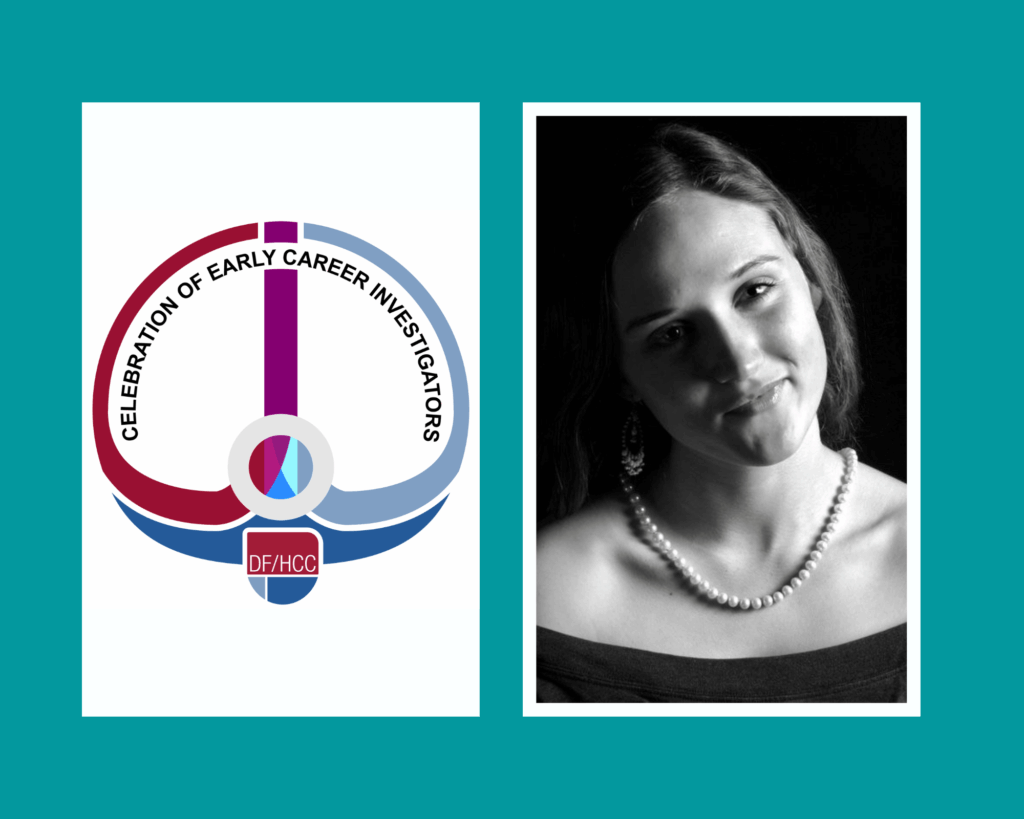
Emma McGee – Presenting at Dana-Harber/Harvard Cancer Center Symposium
CAUSALab researcher Emma McGee was selected to present at a Dana-Farber/Harvard Cancer Center symposium highlighting promising early career investigators in cancer research! She will present work conducted in collaboration with Drs. Barbra Dickerman and Miguel Hernan which discusses methodological challenges in estimating the long-term effects of lifestyle interventions for cancer survivors. The symposium will be held this Friday, February 10, 2023, online and in-person at Dana-Farber. For more details and to RSVP:
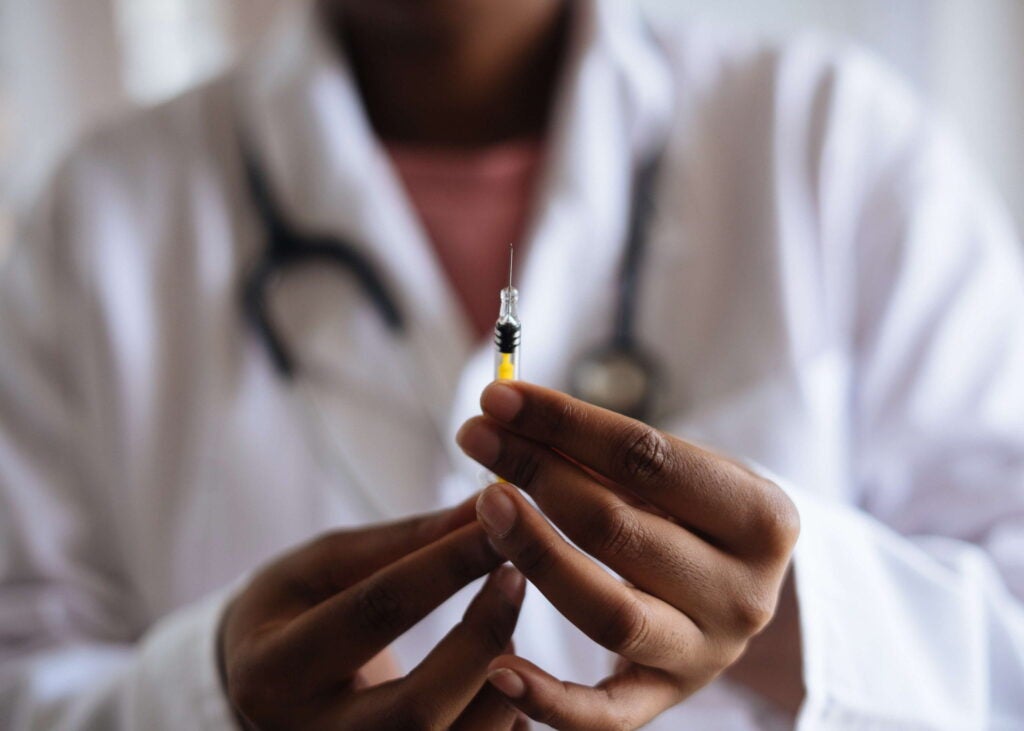
NEW STUDY: Comparative Effectiveness of Third Doses of mRNA-based COVID-19 Vaccines in US Veterans
Third doses of Moderna and Pfizer COVID-19 mRNA vaccines were found to be effective in protecting against SARS-COV-2 infection and severe COVID-19 outcomes based on a large study conducted by the VA-CAUSAL collaboration, a partnership between CAUSALab and the Veterans Affairs (VA) Boston Healthcare System.
CAUSALab researcher Barbra Dickerman was first co-author of this study along with Hanna Gerlovin of the Massachusetts Veterans Epidemiology Research and Information Center, VA Boston.
This study is published in the journal Nature Microbiology and can be found here.
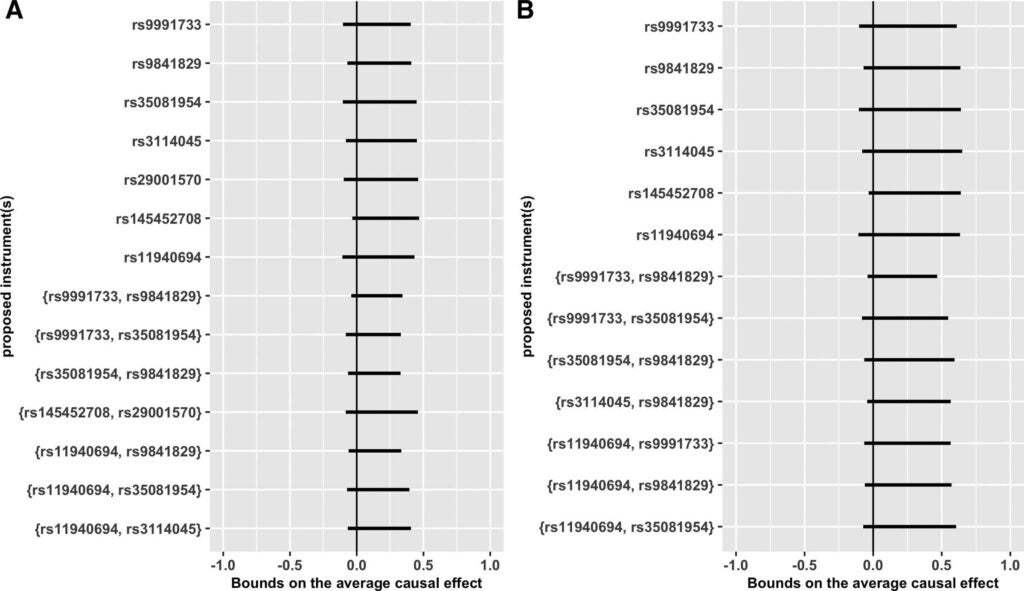
NEW STUDY: Partial Identification of the Average Causal Effect in Multiple Study Populations: The Challenge of Combining Mendelian Randomization Studies
Researchers often use random-effects or fixed-effects meta-analysis to combine findings from multiple populations. However, the causal interpretation of these models is not always clear, and they do not easily translate to settings where bounds, rather than point estimates, are computed. CAUSALab researchers Sonja Swanson and Elizabeth Diemer investigated this by pooling bounds on the average causal effect of prenatal alcohol exposure on attention deficit-hyperactivity disorder symptoms, computed in two European cohorts and under multiple sets of assumptions in Mendelian randomization (MR) analyses. They concluded that all pooled bounds computed in their application covered the null, illustrating how strongly point estimates from prior MR studies of this effect rely on within-study homogeneity assumptions.
This research was part of the HARVEST collaboration, supported by the Research Council of Norway (#229624).
You can read more about their study and results in the Journal of Epidemiology here.

CAUSALab Research Cited as Evidence in FDA Recommendation
Results from our research on Effectiveness of 17-OHP for Prevention of Recurrent Preterm Birth: A Retrospective Cohort Study failed to identify a beneficial effect of 17-OHP for the prevention of spontaneous recurrent preterm birth from our observational, U.S. based cohort. This study was led by CAUSALab researchers Andrew Beam, Joe Hakim and Sonia Hernandez-Diaz, along with researchers, Jessica Hart, Blair Wylie and Amy Zhou and was published in American Journal of Perinatology in December 2021. The Food and Drug Administration (FDA) cited this research as evidence when they recommended removing a preterm drug from the market. You can learn more about the FDA’s decision here.

New Study: Deep Learning Methods for Proximal Inference via Maximum Moment Restriction
CAUSALab researchers Andrew Beam, David Bellamy, Thomas Kolokotrones, Benjamin Kompa, and James Robins presented their new study at NeurIPS’s Thirty-Sixth Conference on Neural Information Processing Systems on November 30, 2022 in New Orleans, LA. The study has been published in ArxIV. Abstract is shared below:
The No Unmeasured Confounding Assumption is widely used to identify causal effects in observational studies. Recent work on proximal inference has provided alternative identification results that succeed even in the presence of unobserved confounders, provided that one has measured a sufficiently rich set of proxy variables, satisfying specific structural conditions. However, proximal inference requires solving an ill-posed integral equation. Previous approaches have used a variety of machine learning techniques to estimate a solution to this integral equation, commonly referred to as the bridge function. However, prior work has often been limited by relying on pre-specified kernel functions, which are not data adaptive and struggle to scale to large datasets. In this work, we introduce a flexible and scalable method based on a deep neural network to estimate causal effects in the presence of unmeasured confounding using proximal inference. Our method achieves state of the art performance on two well-established proximal inference benchmarks. Finally, we provide theoretical consistency guarantees for our method.
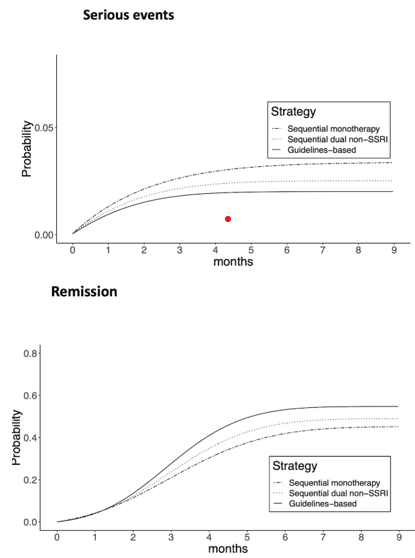
New Study: Emulating a target trial of dynamic treatment strategies for major depressive disorder using data from the STAR*D randomized trial
In this new target trial emulation using data from the STAR*D randomized trial, CAUSALab researchers Alejandro Szmulewicz, Sonia Hernandez-Diaz, Kerollos Wanis, and Miguel Hernan compared three treatment strategies in patients with major depressive disorder for whom citalopram failed as initial therapy: (1) continuously switching antidepressants, (2) continuously combining/augmenting, and (3) to follow guidelines recommendations: switch if no response or intolerability and combine/augment if partial response. The estimated 9-month probability of remission was 43.5% for continuously switching, 47.6% for continuously combining/augmenting, and 53.2% for the guidelines-based. The 9-month relative risk of serious events comparing guidelines-based strategy to continuously switching was 0.62 (0.33, 1.00). In conclusion, using the guidelines-based strategy was associated with an increased probability of remission and a lower risk of serious adverse events. The potential implications are substantial given the large number of patients experiencing treatment failure to antidepressants.

CAUSALab Researchers Win AJE and SER 2021 Articles of the Year
American Journal of Epidemiology and the Society for Epidemiologic Research has named the article, “Study designs for extending causal inferences from a randomized trial to a target population” as one of their 2021 Articles of the Year. Congratulations to CAUSALab authors, Issa Dahabreh, Miguel Hernan, Jamie Robins and Sarah Robertson for this distinguished recognition. Congratulations also to co-authors, Sebastien Haneuse, Ashley Buchanan, and Elizabeth Stuart. The American Journal of Epidemiology describes the 2021 Articles of the Year as, “In our assessment, the articles of the year, which are chosen by the editors of the Journal, represent scholarship that is truly distinguished.”
A list of all 2021 Articles of the Year will be released online and will appear in the American Journal of Epidemiology. Published dates forthcoming.
Thank you to the American Journal of Epidemiology and the Society for Epidemiologic Research for this recognition.

New Study: Effect of Colonoscopy Screenings on Risks of Colorectal Cancer and Related Death
Colonoscopy screening reduces the risk of colorectal cancer, according to the results of the recently published Nordic-European Initiative on Colorectal Cancer (NordICC) trial in the New England Journal of Medicine. This pragmatic, multicenter randomized trial was led by researchers at the University of Oslo with contributions from CAUSALab researchers Miguel A. Hernán and Joy Shi.
The trial included 84,585 participants who were randomized to either receive an invitation to undergo a single colonoscopy screening or receive no invitation. Risk of colorectal cancer at 10 years was 18% lower among those who received an invitation (10-year risk of 0.98%) compared to those in the usual-care group (10-year risk of 1.20%). These findings are important for informing the relative benefits and harms of population-level colonoscopy screening programs and provide evidence for decision makers when prioritizing resources for comprehensive cancer control.

New Study: Tenofovir Disoproxil Fumarate and COVID-19 Outcomes in Men with HIV
Our cohort study of over 20,000 male veterans with HIV from the Veterans Aging Cohort Study (VACS) shows that the risks of SARS-CoV-2 infection, COVID-19-related hospitalization and ICU admissions were lowest for those taking tenofovir disoproxil (TDF)/emtricitabine (FTC), compared with other antiretroviral regimens. Our findings, along with other current evidence, are important to inform clinical trials investigators to further examine the potential role of TDF/FTC as prophylaxis and early treatment of COVID-19 in the general population. This study was funded by National Institutes of Health and US Department of Veterans Affairs Office of Research and Development. You can read more about the report here.
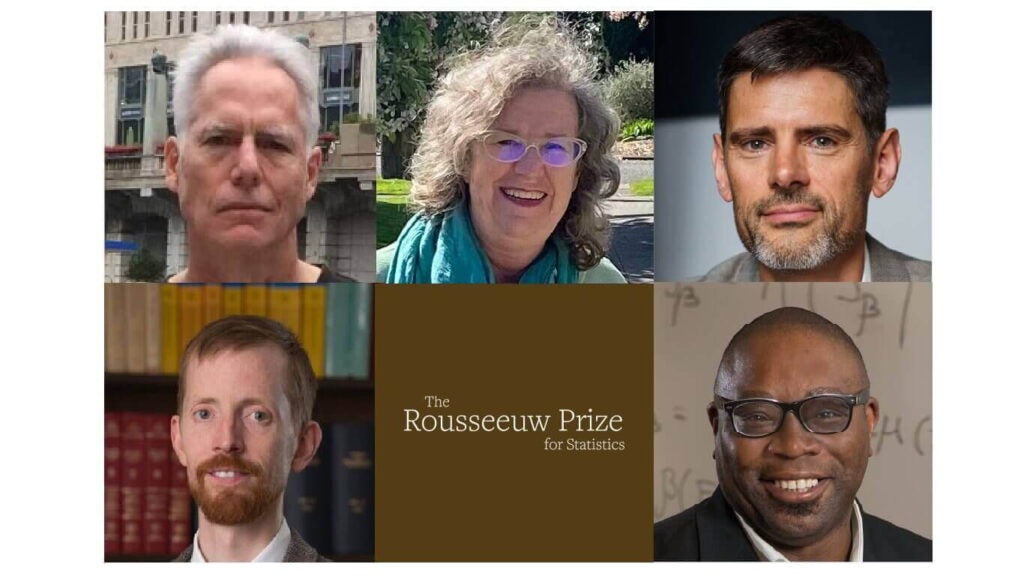
Jamie Robins & Miguel Hernan: Winners of the 2022 Rousseeuw Prize for Statistics
Congratulations to CAUSALab’s Drs. Jamie Robins, Head of Methods Research, and Miguel Hernan, Director, along with the other laureates, Andrea Rotnitzky, Eric Tchetgen Tchetgen and Thomas Richardson, who have won the 2022 Rousseeuw Prize for Statistics for their pioneering work on Causal Inference with applications in Medicine and Public Health!
The King Baudouin Foundation has honored these laureates with the 2022 Rousseeuw Prize for Statistics for their work which has “completely transformed the way in which statisticians, epidemiologists, and others infer the effects of interventions, treatments, and exposures to potentially harmful substances. It has greatly improved the overall reliability of causal analysis in medicine and public health, with great benefit to society.”
As reported in KBF’s press release,
Half the prize amount will go to James Robins of Harvard University and half will be shared by Miguel Hernán (Harvard University), Thomas Richardson (University of Washington), Andrea Rotnitzky (Universidad Torcuato di Tella, Argentina) and Eric Tchetgen Tchetgen (University of Pennsylvania). The latter four laureates were either trained or deeply influenced by Robins. They remain his principal collaborators to this day.
The prize will be awarded at a ceremony taking place at University of Leuven, Belgium on Wednesday, October 12, 2022.

Alejandro Szmulewicz: Winner of the 2022 Young Investigator Grant by Brain and Behavior Research Foundation
CAUSALab researcher and Postdoc Fellow, Alejandro Szmulewicz, has been awarded the 2022 Young Investigator Grant by Brain and Behavior Research Foundation. The BBRF Young Investigator Grant provides support for the most promising young scientists. Alejandro was recognized for his participation in the creation of an international consortium of cohorts of individuals with early psychosis: the FEP-CAUSAL Collaboration that is used as a platform for target trial emulations.

Gonzalo Martinez-Ales – Winner of the 2022 Young Investigator Grant by Brain and Behavior Research Foundation
CAUSALab researcher and Postdoc Fellow, Gonzalo Martinez-Ales, has been awarded the 2022 Young Investigator Grant by Brain and Behavior Research Foundation. The BBRF Young Investigator Grant provides support for the most promising young scientists. Gonzalo’s project on Suicide Prevention will use target trial emulation to estimate the comparative effectiveness of antidepressants for post-discharge suicide prevention.

Emma McGee – Winner of the Eric and Wendy Schmidt Center (EWSC) PhD Fellowship
Emma McGee, CAUSALab researcher and PhD student, has been awarded the Eric and Wendy Schmidt Center (EWSC) PhD Fellowship from the Broad Institute. This competitive fellowship recognizes PhD students doing exceptional work in causal inference, machine learning, and human biology. The fellowship funds 100% of Emma’s graduate school tuition, fees, and stipend.